#because of the impact that said franchise has had it's harder to just drop it for something better for a lot of people
Text
for a while now I've been trying to get into either designing concepts around apocalypse stories that aren't viewed or told from a white perspective, but also getting into reading and conceptualizing an apocalypse that really never stopped for a group of people, that of which, when looking at stories like fallout, for some...it's happening a second time.
and a lot of popular media really doesn't cover character experiences or environmental design based up on that the apocalypse for these characters never stopped or is happening in a quick devastating way a second time.
#irrelevant babble#but also kinda relevant to the [mostly corporate pushed] re-sensationalized popular hyping of a diluted storytelling of fallout#I speak for myself about this but also...maybe I do need to just find either another game (probably indie)#or book or show that touches on a different narrative and view of the apocalypse genre of fictional storytelling#I would say that's what we all should do but that's erroneous#because of the impact that said franchise has had it's harder to just drop it for something better for a lot of people#I hope there's at some point the same energy in finding other media about the apoc genre that people can get into#that's NOT based on fallout but is based in the storytelling of how to survive an apoc environment and situations thereof#much like how there's other ttrpgs that aren't DnD#*sigh*...it's a lot of work to get into at times...but at this current moment...it's worth the trouble to dig outside of the cave#and find some better light at the end of it
2 notes
·
View notes
Note
i saw on twitter you reread the epilogues! would it be okay to ask how you feel about them now on a reread? have any of your opinions changed, for better or worse? i've really loved the art and analysis that's come out of your tumblr/twitter ever since they dropped, so i'm excited to know what you think. i couldn't get a great read on your feelings based on your tweets so that is why i am asking directly, hope that's okay!
Not much changed. That wasn't the first time I attempted to re-read the HS Epilogues, I've gone through bits and pieces of them a handful of times in the years since the original release and it's an effort I make to remind myself of events that happened because I tend to... forget. I don't mind reading books, I like those! In the hellscape that was 2020, according to my StoryGraph stats (great new site, by the way, stop using the Amazon-clawed Goodreads and transfer your account to a black led effort to diversify the current literary environment) I managed to read about 22 new books. Not too shabby for a total dumbass. The problem isn't that it was text-only, they just sort of mush together as a nondescript mass in my brain given enough time.
The first time I finished the epilogues, I said they felt like a purposefully unfinished text, but one at odds with itself (though in much more undercooked words, as I had just spent the last 2 days busy reading it) and it's an impression that has deepened since.
I do not mean anything like "Meat contradicts Candy" with this, that'd be foolish; the dissonance is the fucking point. I know how dubiously canon alternate universes work and I *enjoy* them, otherwise I wouldn't have wasted years in the circus ring that is accompanying Big 2 Comics in the hopes they'd do anything genuinely cool with that concept. Instead, I find there is a general problem in terms of internal cohesion. The Epilogues want to be a lot of things at once, be it a continuation, an expulsion, a deliberate attempt at public scorn, a somewhat genuine play in heartfelt analysis, a reinvention of what came before, or a loaded gun pointed straight at one's own foot. And in the process, they end up undermining the impact of their own strongest moments.
I don't like the Epilogues. Their lukewarm indecisiveness makes for a poor reading experience that needs far more asides, warnings and 'before you read it-'s than the book is worth. It is a text with a particularly distasteful, juvenile fixation in the show and repeated humiliation of sexual abuse victims, and manages to be more regressive about its female characters and what roles they're allowed to play than Homestuck, the 2009 Comic, ever was. And that was disappointing. It's as if the coming of adulthood must sort them into one of two categories: "wanted, desirable" woman or "unwanted, undesirable" woman. It also interacts with trans women in a really shitty way. It is a text married to traditional white-centric politics that makes an attempt to challenge them from that same perspective but falls flat on its face by pulling big moves like "making the alien-Hitler analogue character fight for a rebellion meant to represent racial liberation" and other unsavory choices. But I don't need to like the Epilogues to acknowledge them as both a text that exists and works within a shared universe.
They're pretty fertile ground for dissection and analysis. I think it's interesting how they accentuate some of the worst facets of the HS "canon"/"lore" by being incredibly blatant about their connection to stuff like the Skaianet archives, how they play with Fanservice and Fan Expectation by dedicating so much time to solving or sinking ‘The Davekat Equation’, and how they elaborate on complex facets of old characters. It's a text that acknowledges the existence of fanfiction and popular fanworks on a direct quotable basis (like "Can't sleep without holding onto a motherfucker" of 4Chords fame) as well as Fan Movements that preceded it (the also Gamzee-based "Free the clown!" Rush from 2016) it's intrinsically interactive, and that's not something you can say about a lot of media. The olive branch beckons.
I don't recommend the Epilogues. To me, the Epilogues portray glimpses of two potential, but not absolute, futures soaked in limiting metadoomer pessimism, best appreciated as "what-if" tales taking on the questions of serialization, post-myth, the self-cannibalistic nature of franchises, the abstractness of Canon, the absurdity of fanon, and why fascists like milk. The Epilogues are also not going to magically disappear or un-exist from our collective recollection anytime soon, or… ever. These statements coexist.
I think complex feelings towards media are best put to use in the making of your own art, which is unsurprising, given the fact I'm an artist and a fag, & I've personally enjoyed creating things that interact and rebuke aspects of that text. I've also been graced with the existence of wonderful art from others doing the same, may that be in the form of illustrations, written epics, analyses, comics, videos, songs, the collective transgendering of the series' main character, and all sorts of harder-to-categorize community creations. You can make the best of it. That's my favorite part of the whole ordeal, and one I don't regret one bit.
I hope this is an appropriately satisfying answer on this subject, and if it isn't, well, here's the thing; you can write a better one.
185 notes
·
View notes
Note
TBH I think the whole "You didn't have an issue with this in 'insert x show here' but you have an issue with it in RWBY? What are you, sexist?" thing can easily be defused with a simple, "How did RWBY present this plot-point compared to the show I like?"
Sure, technically Cinder Fall and Darth Maul are the 'same' character, but how are the two presented in their respective shows? Cinder eats up screentime and none of it goes anywhere and gets frustrating. Maul is a relatively minor villain that had one season's worth of attention in CW and then was the villain of a few episodes throughout Rebels before getting killed off.
The only reason someone would be confused as to why people like Maul but hate Cinder is if they just read the two's respective wiki pages.
Really the whole "Your issues with RWBY are just subconscious misogyny" is just some people wanting to slap labels onto others so they can feel validated on not agreeing with their opinions.
Generally speaking, I'm wary of any take that boils down to a single sentence, "You're just [insert accusation here]." Not because such accusations are always 100% without merit—with a canon dealing with as many sensitive subjects as RWBY, combined with a fandom as large and diverse as it has become, you're bound to come across some people whose "criticism" stems primarily from bigotry—but because such dismissive summaries never tackle the problem a fan has pointed out. If one fan goes, "Ruby's plan was foolish because [reasons]" and the response to that is "You just can't handle a woman leader," then that response has failed to disprove the argument presented. The thing about "criticism" based in bigotry is that there isn't actually a sound argument attached because, you know, the only "argument" here is "I don't like people who aren't me getting screen time." So you can spot that really easily. The person who is actually misogynistic is going to be spouting a lot of rants about how awful things are... but very little evidence as to why it's awful, leaving only the fact that our characters are women as the (stupid) answer.
And yes, there is something to be said for whether, culturally, we're harder on women characters than we are men. Are we subconsciously more critical of what women do in media simply because we have such high expectations for that representation and, conversely, have become so used to such a variety of rep for men—including endlessly subpar/outright bad stories—that we're more inclined to shrug those mistakes off? That's absolutely worth discussing, yet at the same time, acknowledging that doesn't mean those criticisms no longer exist. That's where I've been with the Blake/Yang writing for a while now. I think fans are right to point out that we may be holding them to a higher standard than we demand of straight couples, but that doesn't mean the criticisms other fans have of how the ship has been written so far are without merit. Those writing mistakes still exist even if we do agree that they would have been overlooked in a straight couple—the point is they shouldn't exist in either. Both are still bad writing, no matter whether we're more receptive to one over the other. Basically, you can be critical of a queer ship without being homophobic. Indeed, in an age where we're getting more queer rep than ever before, it's usually the queer fans who are the most critical. Because we're the ones emotionally invested in it. The true homophobes of the fandom either dropped RWBY when the coding picked up, or spend their time ranting senselessly about how the ship is horrible simply because it exists, not because of how it's been depicted. Same for these supposed misogynists. As a woman, I want to see Ruby and the others written as complex human beings, which includes having them face up to the mistakes they've made. The frustration doesn't stem from me hating women protagonists, but rather the fact that they're written with so little depth lately and continually fall prey to frustrating writing decisions.
And then yeah, you take all those feelings, frustrations, expectations, and ask yourself, "Have I seen other shows that manage this better?" Considering that RWBY is a heavily anime-inspired show where all the characters are based off of known fairy tales and figures... the answer is usually a resounding, "Yes." As you say, I keep coming across accusations along the lines of, "People were fine with [insert choice here] when [other show] did it," as if that's some sort of "Gotcha!" moment proving a fan was bigoted all along, when in fact the answer is right there: Yes, we were okay with it then because that show did it better. That show had the setup, development, internal consistency, and follow through that RWBY failed to produce, which is precisely what we were criticizing in the first place.
What I also think is worth emphasizing here is how many problems RWBY has developed over the last couple of years (combining with the problems it had at the start). Because, frankly, audiences are more forgiving of certain pitfalls when the rest of the show is succeeding. I think giving a Star Wars example exemplifies that rather well. No one is going to claim that Star Wars is without its problems (omg does it have problems lol), but there's enough good there in most individual stories to (usually) keep the fans engaged. That doesn't mean that they're not going to point out those criticisms when given the chance, just that disappointment isn't the primary feeling we come away with. Obviously in a franchise this size there are always exceptions (like the latest trilogy...), but for most it's a matter my recent response to The Bad Batch, "I have one major criticism surrounding a character's arc and its impact on the rest of the cast, and we definitely need to unpack the whitewashing... but on the whole yes, it was a very enjoyable, well written show that I would recommend to others." However, for many fans now, we can't say the same of RWBY. Yang getting KO'ed by Neo in a single hit leads into only Blake reacting to her "death" which reminds viewers of the lack of sisterly development between Yang and Ruby which segues into a subpar fight which messes with Cinder's already messy characterization which leads to Ruby randomly not using her silver eye to save herself which leaves Jaune to mercy kill Penny who already died once which gives Winter the powers when she could have just gotten it from the start which results in a favorite character dying after his badly written downfall and all of it ends with Jaune following our four woman team onto the magical island... and that's just two episodes. The mistakes snowball. RWBY's writing is broken in numerous ways and that's what fans keep pointing to. Any one of these examples isn't an unforgivable sin on its own, but the combination of all of them, continuously, representing years worth of ongoing issues results in that primary feeling of, "That was disappointing."
Looking at some of the more recent posts around here, fans aren't upset that Ruby is no longer interested in weaponry because that character trait is Oh So Important and its lack ruins the whole show, they're upset because Ruby, across the series, lacks character, so the removal of one trait is more of a problem than it would be in a better written character. What are her motivations? Why doesn't she seek answers to these important questions? Why is her special ability so inconsistent? Where's her development recently? What makes Ruby Ruby outside of wielding a scythe and wanting to help everyone, a very generic character trait for a young, innocent protagonist? We used to be able to say that part of her character was that obsession and we used to hope that this would lead to more interesting developments: Will Ruby fix/update their weapons? Is her scythe dependency the reason why others need to point out how her semblance can develop? What happens if she is weaponless? Surely that will lead to more than just a headbutt... but now we've lost hope that this trait will go anywhere, considering it has all but disappeared. Complaints like these are short-hand criticism for "Ruby's character as a whole needs an overhaul," which in turn is a larger criticism of the entire cast's iffy characterization (Who is Oscar outside Ozpin? Why was Weiss' arc with her father turned into a joke and concluded without her? etc.) and that investment speaks to wanting her to be better. We want Ruby to be a better character than she currently is, like all those other shows we've seen where the women shine. Reducing that to misogyny isn't just inaccurate, but the exact opposite of what most fans are going for in their criticisms.
34 notes
·
View notes
Text
that was the winter anime 2021 that was
Still not quite ready for a dozen posts about how terrible the likes of Combatants Will Be Dispatched are, sorry. Watch Vivy though, it owns. Here’s some more things that are (mostly) good. As always, worst to best.
Yatogame-chan Kansatsu Nikki S3
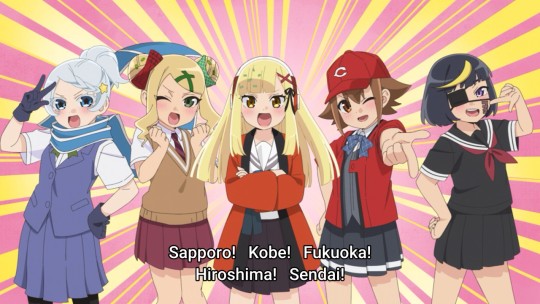
Yatogame has long run out of hot Nagoya facts and its ensemble comedy never amounted to much, so now it seems mostly content to just spam more and more wacky character designs. About the only thing that it has left going for it is that 3 minutes a week are more effort to drop than to watch, so I expect them to make a movie next. 4/10
Go-toubun no Hanayome S2
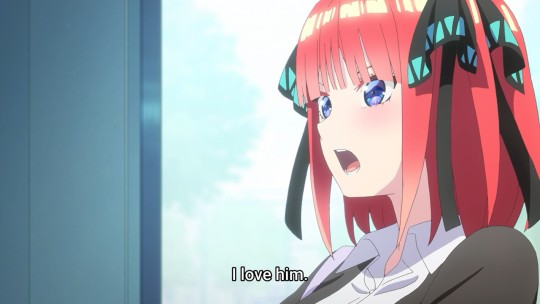
Quints is a weird one. S1 was a barely good enough (i.e., well above average) implementation of the ages old harem chestnut. S2 is actually better at the core of its appeal, since it gives all the characters a sharper profile (things like taking Nino from joke to badass and making Ichika a villain are no mean feat), but it does pay a steep price for it. You see, to deliver a steady drip feed of meaningful character moments it apparently has to rush through the source material at a breakneck pace, which completely wrecks the "story" part of this story and makes every episode seem like a recap. And it still keeps wasting precious time on vestigial nonsense like its framing device and the Kyoto flashback scenario that was already the worst part of S1. But by far the most annoying aspect is its insistence on keeping all the options valid, since it prevents any real progress and makes everything seem arbitrary and pointless. So sure enough, after a season of much ado we still don't end up anywhere — you can't really raise the stakes if all at stake was "who wins" to begin with. It's watchable and even enjoyable scene-for-scene but it's getting harder and harder to call it a solid show overall. 5/10
Skate Leading Stars

I was watching this primarily because I didn't like Yuri on Ice much and wanted to see if something that is a blatant attempt to cash in on it would be better — because while YoI delivers on one aspect (being hella gay), it really is an absolute shambles of a sports show. And sure enough, Skate Leading has none of the auteur appeal of YoI, but it just works much better. In particular I appreciate how it managed to make me care even a little about a cast of assholes, which is a nice contrast to the nauseatingly ingratiating way YoI tries to make you love its characters. Also, Skate Leading is just generally cheap and unambitious, so not susceptible to trying hard and painfully flaming out on the presentation side like YoI is. But at some point you gotta let go of these comparisons and on its own Skate Leading is... just fine, I guess? Competent, mildly engaging, not very memorable. And that's probably where it loses to Yuri on Ice in the end after all, even if I think it's "better". 6/10
Idoly Pride
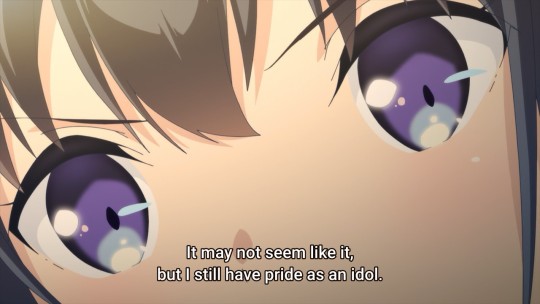
Idoly Pride sold itself on me with a really good (and hilarious/tragic) first episode that was just too bizarre to ignore — I mean, how can you ignore GHOST IDOL MANAGERS. Well, the majority of the show isn't like that. It's a competent and solid version of the idol franchise show, yes, but it really had more potential than that. Especially midseason, it gets lost in these dozens of characters, and while they're all likeable, it does seem like a waste of a good story just centered on Mana/Kotona/Sakura. By the end it comes back around to the heart of the matter with a Maeda-style sob story, which could be a disaster but seasoned veteran Jukki Hanada makes it work anyway. Overall, there's quite a bit of ridiculous hacky melodrama in this, but quite honestly that's the best part and I wish it would concentrate more on it. The rest is just okay. 6/10
Yuru Camp S2
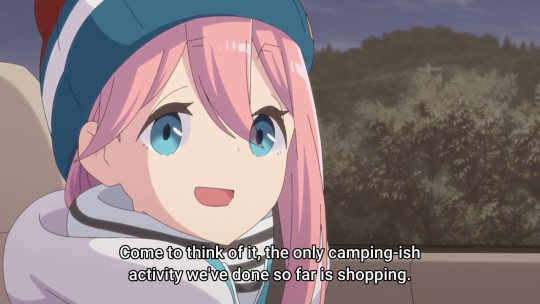
Yuru Camp is still likely the best pure iyashikei show when it gets down to business. Compared to S1 though, this seems to happen less and less. At its peaks (i.e., basically any quiet moment with Rin) it's at least as good as ever, and there's some good cast additions like Mini-Inuko, but it appears that Yuru Camp simply has run out of things you can do with camping and it fills up the time with other... stuff. This stuff includes the generic school club shenanigans it was never particularly good at, and a gigantic helping of crass consumerism. Yeah, I would say the majority of Yuru Camp is just a straight up infomercial at this point, which itself ranges from the perfectly acceptable (which cute anime isn't about food constantly), to the sketchy (I don't know whether the Izu tourism board cut this production a fat check, but if they didn't, Yuru Camp still gives its best effort to make it seem that way) to the highly irritating – I am aware that camping requires gear and you can't just ignore that, but you most definitely do not require whole arcs dedicated to talking about raising funds for the purposes of acquiring the Lamp of Comfy Happiness at your friendly local Caribou™ either. Not to mention an arc where the aforementioned lame school club does the same, for double irritation. Make no mistake, this show is so riddled with scenes that beg for a solution to embed affiliate links in video files that it makes me wish I was watching something as anticapitalist and underground as Love Live. And irritating really is the last thing a show with this core concept, as stellar as it is at that, can afford to be. Bummer. 6/10
SKOO the Infinity
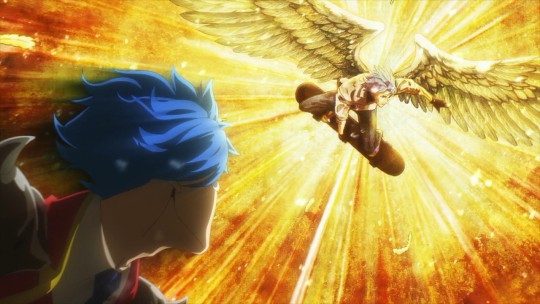
Skoo has one really huge asset: ADAM, its magnificent villain. It also has one really huge liability: Reki, its not magnificent protagonist. To be more specific, it's very good at anything outrageous, physics-defying and silly, such as most scenes ADAM is in, and quite bad at anything serious, dramatic (in a serious way) and down to earth, such as most scenes Reki is in. So, what's the verdict? Well, the rest of the cast is more ADAM-like, and Reki's co-protagonist Langa is fine as the straight (yeah, right) man. The tedious buddy drama is a comparatively small part of this show, and at least it pays off quite well in the end. Seriously, I was ready to give this a 6, but the final episode is probably the best one of the show, in all of its aspects. That's really not something you see often. Skoo's a great time. Except when it's not. 7/10
Non Non Biyori Nonstop
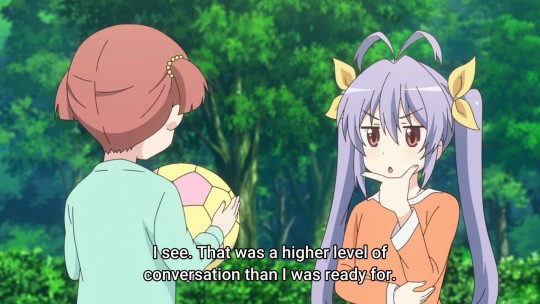
Speaking of the rare good ending, what about we gave one of those to a slim and inconsequential slice-of-life show? NNB has always been solid, comfy and amusing quality with a couple of standout moments (usually something with Renge), and Nonstop has that plus an ending as conclusive as any show of this type is ever going to have. Besides, it does a lot of things right by focusing on more characters than the central 4 (especially Konomi has great material in S3), it expands the universe just enough to not get stale, and it moves things forward — It's definitely a lot better than the movie, is what I'm saying. Apart from that, well, we're three seasons in, if you have any interest in this you probably don't need me to explain what's good about NNB at this point. Bonus points for being nothing but an ad for the manga. 7/10
Wonder Egg Priority
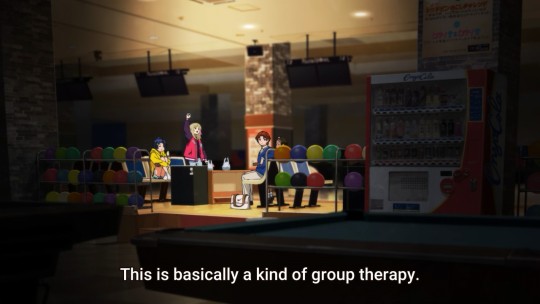
Oh boy, so here's the big one. Wonder Egg is the rare Meaningful Arthouse Show About Real Issues You Guys, as you might have heard. And well, the long and short of it is that it's a very good show with quite a few glaring problems (besides not actually being finished due to production issues, but what we have is enough of an ending to be able to meaningfully talk about it). In particular, one problem: WEP is, at its core, one of these metaphorical Magical Girl-ish series that are just a thin layer of abstraction over coming-of-age or societal problems. The issue is that "metaphorical" in this case means "literal" and "thin" means "basically nonexistent". This show is not subtle regarding what it's about, at all. This is a double-edged sword — on the positive side, some things really should just be said aloud, and I'm really, really fucking tired of the Ikuhara style of "here's some wacky things, maybe a blog post will eventually tell you how it's actually about the most important thing ever" obfuscation — if it's really so important, just spell it out. On the other hand, there are limits to this and when a second, different Ai appears I don't really need a voiceover line telling me that yep, this show is about parallel universes now. WEP spells out many important things, but it also spells out many things that are implicitly clear or better left vague. Not to mention that with being so obvious up front, the show's tendency to leave figuring out what it's actually saying about it up to the viewer can leave the wrong impression. Again, I settled on the opinion that it's subtle after all where it counts the most, but you might easily get the impression that it pulls its punches (Ikuhara does this the exact other way around — once you figure out what the fuck he's talking about it's abundantly clear what he's saying about it).
In fact, this show is so good at subtle, quiet character moments that it calls into question the need for big huge fighting fantasy layer in the first place, especially since I'm not a fan of the fantasy designs and the fights aren't great. Sure, they look impressive on a technical level (this show is very good looking in general), but the lack of actual impact or rhythm makes me think this is not made by people who are very familiar with action and maybe they should have asked some seasoned shounen veterans for this — or just, you know, not do it. They can (and do) impress with character acting in quiet scenes just the same. And while Ai's character story actually does pay off quite nicely by the end we got, and Momoe and Rika are also handled well, Neiru's backstory is significantly less good, not to mention the whole Frill subplot regarding the show's mythology that they introduced just before (and that's the part to be resolved at a later date), which is a huge can of worms. We'll see how well they handle that, I suppose, but as it is it's a weird and vestigial detour that doesn't add much besides thematic headaches.
But yeah, apart from all that — I like it, a lot. Great character writing in the details, cool looks for the most part, tons of ambition, and a message that I consider to be appropriately handled — for the most part, and for now. Not quite ambitious arthouse anime at its finest, but also not a pretentious disaster like Sarazanmai, Monogatari et al. 8/10
#anime#review#winter2021#Yatogame-chan Kansatsu Nikki#Go-toubun no Hanayome#Skate Leading Stars#Idoly Pride#Yuru Camp#sk8 the infinity#Non Non Biyori#wonder egg priority
34 notes
·
View notes
Text
BanG Dream! Favorite List - 9
So now that Morfonica has officially been introduced into the EN server of the game, I think it is time for this list to get updated. Yes, I know I originally said that I would wait until RAS would be introduced as well, but I changed my mind. Mainly because, unlike Morfonica, we already know quite a bit about RAS from the second and third season of the anime.
Which should already hint at something, but let’s just go into the list... I should also specify that while I will not spoil anything specific about the Morfonica band story, I have read it and it has made an impact on this list...
Favorites

Yamabuki Saaya (1, 2, 2, 2, 1, 1, 1, 1, 1)
Not here at the start, however. The start is still the same as always, as a certain vocalist would say. I mean, what can I say? Saaya is awesome, and the only thing that is holding her somewhat back... well, there are two things, really; she’s relatively static and she’s in a band who... isn’t as notable for me, as should become very obvious going down this list (if it wasn’t made obvious already). Nevertheless, Saaya’s still at the very top even if I don’t talk about or write her all that often.

Aoba Moca (2, 1, 1, 1, 2, 2, 2, 2, 2)
No change here, either. Moca is still the same old Moca as she’s always been. The same lovable, teasing, going-at-my-own-pace genius. It really does take something special to be mistaken as my favorite character of the franchise for so long, and Moca definitely has it. And, to be fair, Moca did steal the number one spot for a bit... it’s just that Saaya has reclaimed the throne since then.

Mitake Ran (3, 3, 3, 3, 3, 3, 3, 3, 3)
It would be weird if Ran’s spot wasn’t the same as it’s always been, now would it? In all seriousness, Ran may or may not have been rising in the rankings ever so slightly... mainly because of some interactions during lives that I found out she had. She’s got some pretty fun ones now that I may or may not have never heard before myself.

Satou Masuki (20, 21, 10, 9, 9, 7, 4, 4, 4)
To be fair, Masuki... hasn’t really had a chance to show up, so she hasn’t had the opportunity to show that she deserves to rise in the rankings. Considering she would have to compete with Ran for the number three slot, she probably wouldn’t be rising any time soon, but still... she’s skyrocketed this far up the list, what’s a victim or two more thanks to her rising up the list?

Hazawa Tsugumi (4, 4, 4, 4, 4, 4, 5, 5, 5)
Speaking of victims of Masuki skyrocketing up the list in the past, hi Tsugu. Admittedly quite static, but in Tsugu’s case... why change something that is already as great as she is? Being “normal” is usually a curse in these fave lists of mine, but Tsugumi manages to be a nice contrast to her colorful friends.

Kirigaya Touko (NA, NA, NA, NA, NA, 22, 9, 6, 6)
The first of many (read: five) Morfonica girls. This should not come as much of a surprise; she was already 6th on the previous list. Now that Touko is officially in the game and I can read her band story and her card stories and all... I contemplated for a moment whether I should push Tsugumi down a spot, I really did. But... as much fun as Touko is to see on the screen, I do believe that Tsugumi deserves the higher spot. That being said, I love how Touko manages to be a mix of Lisa’s gyaru-loving self (without the issue that Lisa is facing... more on that when we get to Lisa), the teasing nature of Moca, and the going-at-my-own-pace nature of Moca as well. Definitely a fun and welcome addition to the cast, but...

Hiromachi Nanami (NA, NA, NA, NA, NA, 28, 22, 22, 7)
Talk about a jump; Nanami’s fifteen spots jump puts the eleven spots of Masuki and thirteen spots of Touko to shame. What can I say? Morfonica definitely delivered when it comes to how much I love their characters. When I first read about Nanami I thought she would be the type of girl who is just awkwardly trying to insert herself into the conversation. Now that I have access to scenes featuring her, I can see how much fun watching this little genius is. As somebody who is writing mainly Moca-focused fanfics, it’s a refreshing and amusing change of pace watching Nanami scenes. Is seventh spot a bit ambitious? Maybe. But that’s why she can always change, right?

Uehara Himari (6, 7, 8, 7, 7, 8, 7, 7, 8)
Nothing really changes for Himari, aside from the fact that Nanami now jumped up above her. I don’t like my favorite band’s leader any less; as a matter of fact, with Afterglow’s first album right around the corner... how can I not like my favorite band’s leader?

Udagawa Tomoe (8, 8, 7, 8, 8, 9, 10, 9, 9)
Ah, Tomoe... the most awkwardly ranked Afterglow girl for me. I really love Tomoe, she’s an integral part of Afterglow and her more outgoing expressive nature serves as a nice contrast to the more subdued personalities of her bandmates. But in terms of writing Tomoe it’s always super difficult to give her the best scenes to shine in because of said contrast. Either way, she definitely deserved this spot.

Shirokane Rinko (7, 6, 6, 5, 5, 6, 6, 8, 10)
...yeah, your safety net is starting to get torn. Not only with the introduction of Morfonica (and RAS in the not-too-distant future), but also... the main reasons why you’re still up here are not even necessarily tied to Rinko as a character. What’s worse, the era of Akesaka!Rinko is long gone... which makes it really challenging for me to try and incorporate her newer characterization... which means what is keeping Rinko up is the memory of Akesaka!Rinko, not Rinko herself... In other words, as much as it hurts me to say this, I’m not expecting Rinko to survive dropping significantly in the coming few lists...

Futaba Tsukushi (NA, NA, NA, NA, NA, 18, 17, 16, 11)
And here we got another rise, the “favorite of the Morfonica girls based on first impressions”. As Touko would call her: Fusuke. As I call her: the Himari of Morfonica. I don’t know if it is because Afterglow is my favorite band, but... the comparisons between Morfonica’s members and Afterglow’s members is pretty obvious. Like, Fusuke is (1) the shortest girl of her band, and is made fun of it quite a bit (by Touko, no less XD), (2) the leader of the band, and (3) she even has pigtails. I know people compared her to Arisa when she first was released, but tell me that that doesn’t sound like Himari to you. Especially since I compared Touko to Moca earlier.
Loves

Tamade Chiyu (13, 13, 16, 14, 15, 11, 11, 10, 12)
Same old song for RAS.

Asahi Rokka (12, 12, 12, 12, 11, 10, 12, 11, 13)
Same old song for RAS.

Nyubara Reona (14, 14, 14, 15, 16, 15, 13, 12, 14)
Same old song for RAS. Although, and I think I mentioned this in the previous list, I know the cards she will get. And without spoilering any of them, let’s just say that they are very colorful and I think that Reona definitely delivers when it comes to card art.

Kurata Mashiro (NA, NA, NA, NA, NA, 21, 16, 15, 15)
Mashiron! Or Shiro! Or however you want to call her! I like to call her “adorable”, because that’s what she is; she’s adorable. I knew that you were the shy-type, but I honestly didn’t think I would continue to like you as much as I do considering how much of a shy-type you are. Honestly, you make Rinko look like the most confident girl in the franchise in comparison. But you’re great. You got a great singing voice and a lot of potential and I look forward to see how you will grow over the years.

Maruyama Aya (9, 9, 9, 10, 10, 12, 14, 13, 16)
Nothing has changed about you, for better or for worse. Except the fact that a couple girls shot past you, but that’s beside the point and not at all this girl’s fault. I think Aya still has a lot of potential, but I don’t feel like I have seen enough of it to justify moving her around the list. The fact that she is still up here should signify that she’s definitely still a very good character.
On a side note: my girlfriend wanted to remind me that she still likes Aya, so I guess that’s reason enough for Aya to not drop more than she has? And she technically hasn’t even dropped; Morfonica just jumped...

Wakamiya Eve (11, 10, 11, 13, 12, 14, 15, 14, 17)
Pretty much exactly the same as Aya above you. It becomes harder and harder to think of things to write for characters who don’t move much on the list over the many lists I make.
Likes

Wakana Rei (25, 20, 15, 11, 13, 13, 18, 18, 18)
Same old song for RAS.

Yashio Rui (NA, NA, NA, NA, NA, 24, 29, 29, 19)
Okay, Rui here is an interesting character. For many reasons. I really like what she has going for her; her characterization, her motivation, her emotions (or lack thereof). Just like how Tomoe’s super expressive and outgoing personality contrasts nicely with the more subdued personalities of the rest of Afterglow, Rui’s stoic personality is a nice balance to the high emotional levels (...with the possible exception of Nanami) of Morfonica. That being said, whether Rui doesn’t show or doesn’t feel any emotions is a different thing, and depending on what it is will strongly influence how easy it will be to try and write her.

Shirasagi Chisato (22, 22, 22, 21, 22, 27, 26, 19, 20)
Again, nothing much I can say about you... this list is about Morfonica, mostly... though I will say that I’ve been seeing a lot of good Chisato art as of late.

Hikawa Sayo (17, 16, 18, 18, 17, 17, 19, 20, 21)
Again, nothing much I can say about you other than that being in the band that you are really hurts you...

Okusawa Misaki (10, 11, 13, 16, 14, 16, 20, 21, 22)
Again, nothing much I can say about you other than that being in the band that you are really hurts you...

Imai Lisa (5, 5, 5, 6, 6, 5, 8, 17, 23)
Again, nothing much I can--okay, fine, I will talk about you. In a bubble, I admit that you are a great character. I like Lisa, I like most of her relationships with the other girls and I like her bright and upbeat attitude, especially considering which band she is in. However... what I really despise about Lisa is that she reminds me of a character who I don’t even want to name anymore, and as Kaoru can attest to... that’s not a very good thing to say the least... so down the list you go...

Ichigaya Arisa (15, 17, 17, 17, 18, 19, 21, 23, 24)
I considered putting Arisa above Lisa (or, better phrased, Lisa below Arisa), but... I don’t think that’s fair. I think that, despite Lisa’s shortcomings, I definitely still like Lisa more. That being said, I’ve seen a fun new art of an Arisa card in the future that I will definitely be keeping my eye on.

Toyama Kasumi (26, 24, 23, 22, 21, 25, 23, 24, 25)
You know what’s the saddest part about Kasumi? I think I would like her a lot more if she was not pushed to be the protagonist of the franchise. Yes, I know that somebody has to do it, but... Kasumi has a lot going for her. A lot going for her that ended up being pushed under the rug. I mean, for one, Kasumi got an incredible singing voice that doesn’t get to shine as much as it possibly could because she needs to fill the role of “face of the franchise”.
Above neutral

Hikawa Hina (24, 23, 25, 25, 24, 29, 30, 28, 26)
Talking about why I like Hina is kind of funny, but... as I said in the last post, I started playing Genshin Impact a little while back and my main character is Xiangling (a character voiced by the same person who voiced Hina). So by liking Xiangling more in Genshin I started liking Hina more in Bandori. That’s it. That’s my reasoning for putting Hina above Maya. Because Hina is Xiangling and Xiangling is awesome.

Tsurumaki Kokoro (16, 15, 19, 19, 20, 20, 24, 25, 27)
Ah, Kokoron. You mean well and you’re definitely much deeper of a character than a lot of people might think you are. Unfortunately, the happy happy type songs aren’t my type of songs and, as I have said many times, Kokoro is a nightmare to depict in writing.

Matsubara Kanon (23, 25, 24, 24, 23, 26, 28, 26, 28)
Kanon is great. ...yeah, that’s all I have. Sorry, Kanon, but trying to find new things to talk about when nothing too significant has happened is pretty challenging... I still don’t feel like Kanon has surpassed Kokoro, either, but... it’s definitely getting closer and closer.

Yamato Maya (27, 26, 26, 27, 27, 31, 27, 27, 29)
Maya didn’t drop; I just decided I like Hina more. I still like Maya, I think Maya can offer a lot of potential. But it’s probably already a bit late for me to start diving into said potential, huh?

Kitazawa Hagumi (29, 29, 29, 28, 29, 33, 33, 31, 30)
And there we go, Hagumi surpassed Afterglow’s drummer’s younger sister. Why? Because, well...
Neutral

Udagawa Ako (19, 18, 20, 20, 19, 23, 25, 30, 31)
Being in Roselia is really detrimental for you, huh Ako? What’s worse, her one and only niche of being a gamer has effectively been taken away from her as Shining Sunlight proved I can do a gaming-focused plot without Ako and it works well enough. So far, anyway.

Hanazono Tae (18, 19, 21, 23, 26, 30, 32, 32)
The same as always for this girl, and unlike the girls at the top I am begging Bushiroad to do something that would help her climb up the rankings again. Because Tae is likeable and a nice character... she just doesn’t stand out enough for me...

Ushigome Rimi (28, 28, 27, 26, 28, 32, 32, 33, 33)
And the same holds true for Rimi. At least Rimi got some cool calls in lives, but... that’s not enough... that really isn’t enough...
Below neutral
Seta Kaoru (VB, VB, VB, VB, VB, VB, VB, 34, 34)
I will admit this: the fact that another character has taken your place on the very bottom of the list definitely helped make me dislike you less over the months. And I will also admit that you have some niche potential, especially since my earlier first impression of Rui being like you seems to be false (for better or for worse). Will I take you up to take advantage of that? Probably not... but fair is fair: I know the possibility is there so I figured I might as well acknowledge the fact that I know of the possibility.
And that’s all the characters, right? I definitely didn’t miss anyone, or at least I don’t think so. Eh, if I did then she probably isn’t important enough for me to mention.
2 notes
·
View notes
Text
I think this is an important debate right now so I'm gonna just drop the whole article in here as well:
By John Hoey, April 13, 2020
"Daisy Ridley has been a part of Star Wars for over five years and has seen the best and worst sides of its fans. Now that the sequel trilogy has ended, concluding Rey’s story (for now), the actress shared her take on the constant negativity coming from fans who didn’t like The Rise of Skywalker and the impact it has on those who create the films, as well as her personal etiquette and social media preferences. Ridley’s thoughts on online fan culture make this as good a time as any for us fans to take a reflective look at ourselves and the impact we have on the Star Wars franchise and its future.
In an appearance on the podcast DragCast, Ridley was asked about her personal social media preferences and spoke clearly about why she doesn’t have social media (it’s not as dramatic as some have made it out to be), and her thoughts on the fans who choose to lash out with backlash toward Star Wars films, most recently The Rise of Skywalker.
First it needs to once again be made clear why Daisy Ridley is not publicly on social media:
“I was asked to go on it, and, at the time, I was like, ‘Okay,’ and then it got to the point where I didn’t want to be on it and I was at my friend’s house in L.A., and I remember being like, ‘Oh, I don’t want to be on Instagram,’ and they were like, ‘Well, why don’t you come off?’ and I was like, ‘Oh.’ And it was really a nice, autonomous decision. Because I was like, ‘Oh, I don’t actually have to be on it. This is nice.’ And I always had a limit to what I shared anyway and, honestly, my life isn’t that exciting. So there were a lot of separate things.”
Ridley talks about how things have changed since 2015’s The Force Awakens, which was universally loved for the most part. If you read between her carefully chosen words, she is basically saying social media has brought negativity much more to the surface than it used to be.
“It’s changed film by film, honestly. Like 98%, it’s so amazing. This last film, it was really tricky. January was not that nice. It was weird, I felt like all of this love that we’d sort of been shown the first time around, I was like ‘Where’s the love gone?’ I watched the documentary, the making-of, this week, and it’s so filled with love, and I think it’s that tricky thing of when you’re part of something that is so filled with love and then people. You know, everyone’s entitled to not like something, but it just, it feels like it’s changed slightly, but I think in general that’s because social media and what have you.”
Ridley takes to the popular lesson parents everywhere try to teach their kids, “If you have nothing nice to say, don’t say anything at all.” Well, that doesn’t play in fandoms, of any kind. Daisy admits to finding the backlash to The Rise of Skywalker upsetting, and how she tries to avoid it as much as possible, while acknowledging how easy it is for people to have an outlet, in turn leading to more opinions reaching the public sphere.
“I think in general, people share so much on social media that if I went—I don’t have social media, anyway—but if I went to a film and didn’t like it, I just wouldn’t tweet about it,” she continued. “But it’s such a conversation and it always has been. I guess now conversations are just more public, so there’s stuff I wouldn’t have seen, but honestly trying to scroll through my newsfeed in January and trying not to see Star Wars stuff, I’d see headlines and be like ‘Oh my god this is so upsetting.’ So it’s been tricky, but then it’s having that thing of I feel really proud of it, and I’m so thrilled to be part of it. Yeah, but it’s a funny thing.”
I think a big part of the allure to posting our takes into the endless reaches of social media is people want to be heard and feel relevant. There is an inherent human instinct to want validation, and if your thoughts on something get showered with likes and retweets and comments, that validation is fed. But, if our output is negative it can snowball into a sub-culture that has a significant impact. I have had conversations with plenty of people over the years in the film industry and even inside Lucasfilm who have said they pay attention to what’s going on on social media. Now I say that with hesitation as that could entice people to be more vocal, but the point is, they keep tabs on who says what, especially those who are legitimate influencers in the community. They pay attention more than you realize.
The downside of this is creators and talent are also very aware, and for some it has become unattractive to want to work on Star Wars after seeing the hell and hate George Lucas, J.J. Abrams, Rian Johnson, and other creatives have gone through. Perhaps that’s why we’re scratching our heads lately at some of the unknown names we’re seeing popping up as writers and other significant crew members on important upcoming projects. The editor of Del Rey books Tom Hoeler publicly admitted it is hard finding authors to write Star Wars books, which is under a much, much dimmer spotlight than writers, directors, and actors.
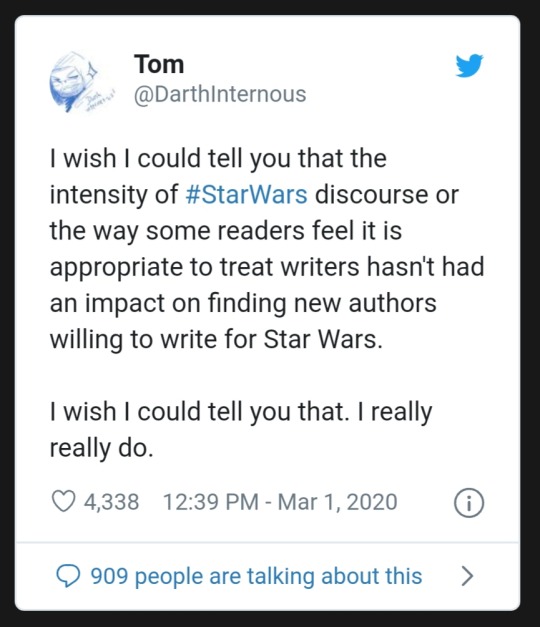
The more Star Wars “fans” poison the well of social media with negativity, backlash, and hate toward the films and those who make them, the harder it will be for Lucasfilm to convince talented people to want to work on projects from a galaxy far, far away, when they can just as easily take their talents to less murky waters.
There are varying degrees as well as extremes of negativity online, and the biggest extreme are those who threaten violence against creators. Now some will say this is just a joke, but I can’t imagine how anyone would find something like this humorous, especially in today’s world.
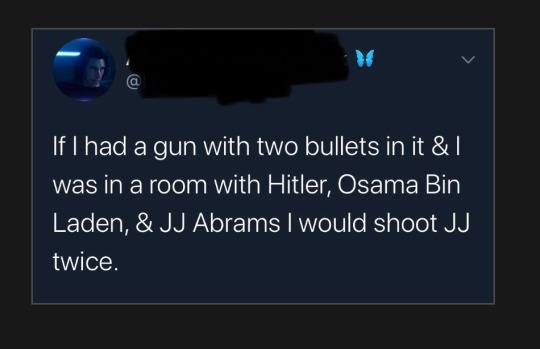
Now many will rebut by saying that type of behavior is not representative of all who didn’t like the movie, and that is completely true. That goes without saying. But, as with what happened with The Last Jedi, where hate toward the movie and Rian Johnson permeated for years after the movie’s release (continuing to this day), perpetual and constant output of negativity, even if done without hostility, fosters and ferments the culture of hate. As Daisy Ridley said, everyone has a right to not like something, but I am not sure what good it does if you voice that disdain and/or hate non-stop. If you left the theater after seeing The Rise of Skywalker and took to your Twitter account to tell your followers you hated the movie, that’s all well and good. Did you take the next couple of weeks to point out things you didn’t like about it? That makes sense. Your message was likely received. But if you feel a need to constantly beat the same drum of negativity over and over five months later and into the future, perhaps you need to rethink your approach if you believe your thoughts haven’t been clear or resonated with people.
I am personally not a big fan of The Clone Wars or Ahsoka Tano, but instead of bashing Dave Filoni or the animation department on a daily basis, I opt to talk about things I like instead. I catch myself taking a turn to negative town from time to time, we all have our moments, but I think if we care about Star Wars and want it to succeed and attract the best filmmakers and talent possible, perhaps it’s our responsibility as fans to be better and create a better online culture together. Not all fans pay attention to the pulse of fans online, but it’s a growing part of all fandoms, not a shrinking one, so I hope we can all channel our inner Jedi and be more polite, respectful, and kind to creatives and each other on social media and in general.
This culture of negativity is not limited to Star Wars, as other movie and TV franchises, sports, music, and anything with mass followings suffer from similar problems. I still believe Star Wars fans are overall good, and while sometimes we feel smothered by the spread of negative vibes when we try to connect with our fellow fans online, we need to always try to remember one thing about the good people in this fandom…there are more of us."
#daisy ridley#the rise of skywalker#star wars#fandom discourse#tros negativity#star wars negativity#fandom negativity#anti tros#rian johnson#jj abrams#star wars fandom#sw discourse#tros backlash#rey
1 note
·
View note
Note
Scrawlers you’re not gonna leave the fandom are you? I know a lot of people who are dropping Pokemon altogether because of this National Dex fiasco, which is really upsetting. Personally even though Pokemon’s main games have been in a slump lately I always stick with this franchise in the hopes that things will turn around but I know not everyone is that optimistic. I’d hate to see you leave because your passion for these games something I’ve always loved but it’s your choice in the end.
Your timing for this ask is spot-on because I was just about to make a post about it, haha.
Short Answer: No, I’m not going to leave the fandom.
Longer Answer:
Pokémon is not just a fandom for me. I usually express this through two separate jokes (“Pokémon is a way of life” and “Pokémon is my past, present, and future, Harry Potter”), but I honestly mean it in all seriousness. I have loved Pokémon for 21 years. Pokémon helped me overcome bullying (though my fists also did that) and make my first friends (my fists weren’t involved here) in elementary school. Pokémon was my go-to escapist fantasy during the hellish life I had in my childhood and adolescence due to parental abuse at home. I bred my arcanine so that my platonic soulmate would have a way to still be with me even after her death. Of course the arcanine is not the same as having the real, breathing dog, but it’s the best I can do with what I have. The original Pokémon overture brings tears to my eyes every time I hear it. It’s the one fictional world I would want to live in, without hesitation.
That isn’t something I can let go of, or leave behind. Pokémon is way too special to me for that. It’s not something that I could replace with another monster series (hence why things like Yo-Kai Watch hold no appeal to me), or another game series. The idea of dropping the Pokémon games forever from here on out is painful to me. I pass on lesser Zelda titles all the time if they don’t look like they’ll be fun or interesting. I do the same thing with lesser Sonic titles. But Pokémon? The fact that the Let’s Go games were main series games that were such trash and that threatened in ruining the main series forever (which it seems they’ve succeeded in doing since no one listened and everyone bought them new anyway) upset me deeply. For the first time since 1998 I didn’t buy a main series Pokémon game. Sure, I saved $60, but it really, really hurt and upset me that I couldn’t be excited at the launch of a new main series Pokémon title. To be fair, I wasn’t excited for Ultra Sun / Ultra Moon either, but I still bought and completed Ultra Sun because at least it didn’t carry the threat that if it sold well the rest of the franchise would be negatively impacted. Let’s Go Pikachu / Let’s Go Eevee did carry that threat, and have now made good on that threat, and so I skipped them to do my part to try to save the franchise that I have loved with all my heart since I was eight years old.
But I alone wasn’t enough.
Masuda Junichi has given several different reasons why the National Dex won’t be in Sword / Shield, but every single one of them is nonsense.
“We don’t have time,” he says, but not only would no one mind if the games were delayed if it meant making them better, but they could always patch in non-Galar pokémon later, and everyone would be fine with that since Home won’t be released until some time in 2020 anyway.
“We’re making all the models unique and over 800 is too many,” he says, but:
Scorbunny’s kicking animation is the exact same as Buneary’s (pretty sure it was Buneary; maybe it was Bunnelby, but still)
The models they created for X / Y were future-proofed, meaning that they were already fully rendered 3D models that just weren’t being shown in the highest possible resolution on 3DS. They don’t have to remake models for all the old ‘mon, just the new ones.
They have walking / running animations for every single pokémon through Alola that they just haven’t used, meaning that so much of the work is already completed.
They could just upscale pokémon for Gigamaxing, and could have done the same for the Totem Pokémon in Sun / Moon, but apparently they don’t know how to do what is honestly a rather simple thing to code because they chose instead to make brand new models for the Totem Pokémon and likely the Gigamax one, and also created brand new models for NPCs for completely unnecessary reasons (e.g. they made a brand new Lillie model for every area she appeared in, which bloated the amount of models in the game for no goddamn reason), something which was found in the Sun / Moon datamine. If there is a lot of work to be done, it’s because Game Freak is purposefully choosing to work harder, rather than smarter. All this, despite the fact that they hired a programmer specifically for consoles about two years ago.
“We care about game balancing,” he says, but not only has Masuda in particular been adamant about killing off the competitive scene (removing things like the Battle Frontier because he thinks players will find it to be “too hard,” removing EV training from Let’s Go, and so on), but the only reason why having certain old pokémon in the game would throw off game balancing worse than in previous gens is because the Galar pokémon have stats that are just that bad, which spells bad things for competitive play in these games anyway. These games which, mind you, were supposed to be for us, the core players.
“We want to stick to a regional theme and will pick pokémon that apply to the widest base of players,” he says, meaning that only popular ‘mon and Pikachu are likely to make the cut.
“Having 800+ ‘mon is very intimidating to players,” he says, which is what ties the blame back to Let’s Go and its sales. Let’s Go only had the Kanto ‘dex (+Meltan) because they didn’t want Go players to be intimidated by the large amount of pokémon typically available in a new game. Of course, we all knew this logic was flawed back when that was announced: If Go players would be intimidated by the national ‘dex in Let’s Go, how was limiting it there supposed to help them get used to it in Sword / Shield? Well, now we have our answer: Masuda never intended to give it back to us. He always wanted to limit it, because he doesn’t want the core players to play the games anymore. He only wants the Go fans to play.
Here’s the thing: The majority of my One True Team™ is already confirmed to be in the Galar ‘dex. Charizard, Arcanine, Espeon, Umbreon, Mimikyu, Kanto Raichu, and most likely Lapras are all going to be in. (I say most likely, because a Lapras regional evolution was in the leak that has been spot-on about things such as Nessa and Gigamaxing so far, so I would be very surprised if Lapras wasn’t in.) The only ones who are still up in the air for me are Furret and Midday Lycanroc. So the issue here is not what I personally am able to bring over. The issue is the principle of the matter.
See, here’s the thing: I’m lucky because most of my One True Team™ are pokémon that most everyone likes. Everyone loves Charizard. Everyone loves the eeveelutions. Mimikyu was a surprise hit. Arcanine, while less loved than Ninetales, is tied to some cool east Asian mythology and so is unlikely to be cut, and so on. But not everyone is in the same position I’m in. My best friend’s favorite pokémon is Scolipede. Her second favorite pokémon is Kabutops. How likely do you think it is those two will make it in? And if they don’t make it in Gen VIII, how likely it is do you think they’ll return for Gen IX?
Every pokémon is someone’s favorite. For everyone that hates Trubbish or Vannilluxe, someone out there loves them. And to say that those people shouldn’t be able to bring the ‘mon they’ve raised for generations over to this new region, even eventually—and to double down and say that every single new generation will be like this from now on—is unacceptable. During the press conference that aired the week before the Pokémon Direct, they said when announcing Home that the purpose was to allow us to stay connected to the ‘mon that we’ve bonded with over generations. They know that there are those of us out there who have brought pokémon up ever since the Game Boy generations, and they want us to continue journeying with them. They made it sound as if we could use Home to transfer our pokémon to Sword / Shield, and now they’ve yanked that away from us. They’ve gone back on their word. They lied not only to their fans, but to their stakeholders, during that press conference, and if you were watching Nintendo’s stock around the time the Treehouse video was airing live, their stocks took a dive as a direct result.
And while this is the thing I’m most angry about, it isn’t even the only thing. They also announced during the Treehouse that they’re not only removing the National Dex, but that they’re also removing Mega Evolution in favor of Gigamaxing. This one actually does impact me directly, because I bred and raised my Charizard around the fact that I would Mega Evolve her into Mega Charizard X. I painstakingly hatched hundreds of Adamant Charmander. I EV trained her so that her stats would be perfect. I gave her a moveset built around ‘Zard X. And now, even if I can bring her over to Galar, I won’t be able to Mega Evolve her because the Key Stone and Charizardite simply won’t be available in the game. This, despite the fact that they have the assets for it thanks to Let’s Go. There is absolutely no reason to remove Mega Evolution when Mega Evolution’s assets are already available in a game on this system. There is no excuse. They’re just doing it anyway, because they want everyone to focus on their shiny new mechanic, and demonizing Mega Evolution apparently didn’t do a good enough job of that in Gen VII. (That said, they’re also removing Z-Moves, so apparently they weren’t too attached to those either.)
I just … I can’t support this. I cannot support any of this. It kills me. I feel incredibly conflicted, because there is a lot in Sword / Shield that I still am excited for. I love a lot of the new pokémon, such as Corviknight, Zacian, and Yamper. I like several of the new trainers we’ve seen. I think the region looks gorgeous. But I don’t want to give Game Freak and Nintendo money for any of this, because that will make them think that what they’re doing is a good idea. Just like with Let’s Go, where Masuda said that if those games sold well they would shape the next twenty years of the franchise (which they did, and they are), I don’t want to reward them for poor decision making.
So I’ve decided to buy Sword used.
When you buy a game used through Game Stop or a similar store, the store gets every single cent. Nintendo and Game Freak see none of it. I still want to play these games for the features I like. But I do not, and will not, support Game Freak and their asinine decision making. So while I might not be able to get Sword on launch day (though we’ll see; I’ve seen used games in Game Stop on launch day before), I’ll be able to get it soon enough and play it in a way that just doesn’t support Game Freak or what they’re doing. I’m only one person, and as we saw with Let’s Go, my lack of sale isn’t going to be enough to stop the train wreck. But if the severe backlash they’re facing now isn’t enough to do it (last I checked, the Treehouse video had 13k Likes in contrast to 24k dislikes, and angry hashtags about this are trending in both the west and Japan on Twitter), then I want to contribute in any way that I can. I love this series too much to just passively support every bad decision Game Freak makes that lessens not only my enjoyment, but also the enjoyment of so many others.
So no, I’m not leaving. I will always love Pokémon. And if Game Freak and / or Nintendo decide to listen to the backlash and backtrack this decision—say, make a statement saying they’ll patch in all the rest of the pokémon later, and hopefully even give us Mega Evolution back—then I’ll happily go back to buying a new copy of the game on Day 1. But until then, I’m buying used from now on. They don’t deserve my money if they’re going to act like this. And again, I alone won’t make a difference, but if there’s one thing that Pokémon has taught me over the years, it’s that that doesn’t mean I shouldn’t try.
16 notes
·
View notes
Link
A Grudge Match in Japan: One Corner, Two 7-Elevens HIGASHI-OSAKA, Japan — Across Japan, it can seem as if there’s a 7-Eleven on every corner. Now, on a single corner in a working-class suburb of Osaka, there are two. The unusual pairing is the latest manifestation of a grudge match between one of Japan’s most powerful companies and, arguably, one of its most stubborn men. Mitoshi Matsumoto, a franchisee, ran one of the two 7-Elevens until the chain revoked his contract in 2019 after he dared to shorten his operating hours. For over a year, his store has sat empty as he and 7-Eleven have battled in court over control of the shop. Fed up and with no end in sight, the company decided on a stopgap: It built a second shop in what used to be Mr. Matsumoto’s parking lot. The conflict’s outcome will determine not just who gets to sell rice balls and cigarettes from one tiny patch of asphalt and concrete. It could also have profound implications for 7-Eleven’s authority over tens of thousands of franchise shops across Japan, part of a convenience store network so ubiquitous that the government considers it vital to the national infrastructure during emergencies. 7-Eleven has gone to surprising lengths against Mr. Matsumoto. It hired a team of private investigators to watch his store for months, collecting grainy video that, the company asserts, shows him head-butting one customer and attacking another’s car with a flying kick. It has also compiled a dossier of complaints against him, including one over a bungled giveaway of “commemorative mayonnaise.” And now it says it plans to charge him for the cost of building the second shop next to his. The company maintains that it moved against Mr. Matsumoto simply because he was a bad franchisee. But he argues that it is no coincidence that the company’s view of him dimmed sharply after he said he would defy its rigid demand that stores stay open around the clock. Before his seemingly small act of rebellion, the company had deemed him a model worker. He had received praise for, among other things, having the highest sales of steamed pork buns in his region. After his decision, 7-Eleven threatened his business and eventually cut off his supplies and sued to take over the store. With its actions, Mr. Matsumoto says, the company is sending a message to other franchisees: The nail that sticks out gets hammered down. The fight playing out in an Osaka courtroom will have ramifications for 7-Eleven and the rest of Japan’s major franchises, which control the vast majority of the country’s more than 50,000 convenience stores. 7-Eleven accounts for nearly 40 percent of those, and its business practices, for better or worse, have long been viewed as the industry standard. “The outcome of this trial will have an enormous impact,” said Naoki Tsuchiya, an economics professor at Musashi University in Tokyo. “A loss would be a considerable blow to the company,” but a win would “shift the balance of power away from the franchisees and toward corporate HQ.” Mr. Matsumoto ran the first of the two 7-Elevens from its construction in 2012 through the end of 2019. Situated on a busy street near one of the largest private universities in the region, the store has been shuttered for 16 months, musty, dark and gathering dust. The second 7-Eleven, a scaled-down version of the shop next door, is being built as a service to the neighborhood, the company says, after residents expressed concern that the empty store was a security issue. The new shop has the knocked-together look of the temporary housing that springs up in the wake of a natural disaster. When the finishing touches are put on in the coming days, it will be operated — 24 hours a day — by 7-Eleven itself. For most of the seven years that Mr. Matsumoto operated his 7-Eleven, he faithfully carried out the demands for round-the-clock operations, which boost corporate profits but can be costly for franchisees, who shoulder the labor costs. The pace became unsustainable, though, as help became harder and more expensive to find — a problem that grew more acute after his wife’s death from cancer in the spring of 2018. In February 2019, he announced that he would close his store from 1 a.m. to 6 a.m. each day. 7-Eleven began pressuring him to return to round-the-clock operations, his defense team wrote in court filings. Mr. Matsumoto, who prides himself on being persistent and plain-spoken, did not back down. He went to the news media and described the industry’s harsh labor conditions, including his own days working 12 hours or more. His story hit a nerve in a country where overwork is rampant and sometimes fatal. His willingness to criticize 7-Eleven in ways that most other franchisees would not made him famous. It also cast a light on the hidden costs of ultraconvenience in Japan, where convenience stores fulfill many of life’s daily needs and are often held up as symbols of the country’s remarkable efficiency and customer service. 7-Eleven stood down in its clash with Mr. Matsumoto over his shorter hours. But his relationship with the company, which had always had some problems, reached a breaking point in October 2019 when he announced that he would close the store entirely for one day, on New Year’s. In late December, 7-Eleven notified him that it would revoke his contract unless he took unspecified action to restore a “relationship of trust.” It gave him 10 days. The company said it was responding to two problems. One, Mr. Matsumoto had attacked it on social media. Two, he had racked up hundreds of customer complaints. (It would later claim, without providing evidence, that it was the largest number of any store in Japan.) It was the first time, he said, that the company had ever brought the problem to his attention. The company denies this. The first complaint came in the months after the store’s grand opening. Mr. Matsumoto and his wife had papered the neighborhood with fliers promising a squeeze tube of “commemorative mayonnaise” to any customer who showed up on the first day. The mayonnaise ran out in hours, and Mr. Matsumoto ended up telling hundreds of shoppers to come back later that week to claim their gift. Over a month later, one disgruntled customer tried to cash in the I.O.U., then fired off a scathing complaint when she was refused. The other complaints range from serious accusations — berating customers — to minor quibbles. The dossier also contains a number of complaints from former employees about pay and working conditions that echo some of Mr. Matsumoto’s own complaints about 7-Eleven. Mr. Matsumoto does not pretend that everything at his store was perfect. For years, he had been engaged in a heated battle over his parking lot, where customers of other businesses would often leave their cars for hours without so much as a thank-you. By Japanese standards, Mr. Matsumoto’s neighborhood is a little rough. People cut in line. They cross the street against the light. They aren’t afraid to give a convenience store owner a piece of their mind. He gave as good as he got, he readily admits, and he was not popular with the neighbors. On more than one occasion, a shouting match over parking spaces ended with a call to the police. They always sided with him, Mr. Matsumoto said. 7-Eleven had never seemed particularly interested in the occasional blowups, but after he declared that he was closing early, it began taking a very specific interest in them. In the summer of 2019, the company hired private investigators to keep tabs on Mr. Matsumoto’s store, it wrote in a court submission. Perched in a nearby building, they spent months secretly filming the shop’s comings and goings. The result is 7-Eleven’s evidential pièce de résistance: five videos of what appear to be confrontations between Mr. Matsumoto and various customers in the parking lot. Two involve what the company says are the flying kick to the car and the head-butt, but it is difficult to make out much of the blurry footage presented to the court. Another video shows Mr. Matsumoto upbraiding a man in a white van. Two men loitering nearby are surreptitiously taping the argument, and the company has crosscut shaky footage from their cameras with video taken from the balcony above Mr. Matusmoto’s shop to give several perspectives on the exchange. When approached for comment, a 7-Eleven representative referred reporters to the company’s court filings. Mr. Matsumoto’s legal team has years of experience fighting convenience store chains in court, but one of his lawyers, Takayuki Kida, said that “there aren’t many cases that are full-out war, where 7-Eleven is this set on crushing someone.” It’s easy to see why, said Mr. Tsuchiya, the Musashi University professor. The attention on Mr. Matsumoto has already helped spur change in the industry. In September, a broad inquiry by Japan’s Fair Trade Commission concluded that the convenience store industry’s 24-hour-a-day policy was unsustainable and ordered stores to give owners more flexibility or face possible legal action. Under pressure, 7-Eleven has increased franchisees’ share of revenue and, during the pandemic, taken a more lenient stance on operating hours. It is not clear how far the changes will go or whether regulators will follow through on their threat. Mr. Matsumoto is bemused by 7-Eleven’s decision to build a new shop next door to his. “Everyone had forgotten about me,” he said during a recent visit to the construction site. “Now they’ve put me back in the news again.” As he watched a crane do excavation work, a passing bicyclist stopped to share a few words of encouragement, urging Mr. Matsumoto not to let the “big guys” win. Last year, Mr. Matsumoto says, the company offered him 10 million yen, or more than $92,000, to drop his case. The court encouraged him to accept the offer. But he wasn’t interested. Now, the company is trying the opposite approach. Its lawyers have said they will bill him ¥30 million for construction of the new store. Either way, it’s the same to him, Mr. Matsumoto said. “It’s not about the money,” he said. “It’s about something bigger.” The same could be said for 7-Eleven. A sign in front of the construction site sums it all up: The building is temporary. Win or lose, the company plans to tear it to the ground. Source link Orbem News #7Elevens #Corner #Grudge #Japan #match
0 notes
Link
>

Georgia Gov. Brian Kemp (R). | Getty Images
The debate over whether Georgia’s law really suppresses voting reveals just how imperiled American democracy is.
Georgia’s new election law SB 202, which many experts decried as an attack on the fundamental fairness of the state’s elections, was compared to Jim Crow by many leading Democrats. Now some observers are pushing back, arguing the bill falls well short of a democratic apocalyptic.
In the New York Times, Nate Cohn concluded that “the law’s voting provisions are unlikely to significantly affect turnout or Democratic chances.” Slate’s Will Saletan notes that some provisions really are troubling, but that the bill also contains good provisions and that critics have “overhyped” their concerns. Brian Riedl, a senior fellow at the conservative Manhattan Institute, writes that “the idea this is an epic war on voting rights is simply absurd.”
On one level, it’s a fair topic of conversation, and the critics make some good points. Research on the effect of voter ID requirements often does find small or no effect on turnout; President Joe Biden’s description of the bill as “Jim Crow on steroids” certainly overstates the case.
But at the same time, some of the policy conversation about the Georgia bill is deeply frustrating. The close reading often takes place in a vacuum, disconnected from the context that gave rise to the law in the first place.
The fundamental truth about SB 202 is this: Its very existence is predicated on a lie. The bill’s passage was motivated by unfounded claims of fraud in the Georgia presidential elections — lies that Donald Trump spread and continues to spread, with the help of both state and national Republicans.
“President Biden, the left, and the national media are determined to destroy the sanctity and security of the ballot box,” Georgia Gov. Brian Kemp said in a statement after the bill’s signing.
The problem with discussing Georgia’s law solely in the narrow terms of what this or that provision does is that it implicitly concedes that the law is a reasonable enterprise to begin with: that the rationale for its passage is legitimate rather than an effort to further a fraudulent and dangerous narrative.
“The conversation is something like the mid-2000s debate over whether torture works. It basically doesn’t, but to even have that debate is to have surrendered something,” writes Seth Masket, a political scientist at the University of Denver.
The Georgia bill is not merely the sum of its provisions in a country where 60 percent of Republicans believe the 2020 presidential election “was stolen” from Trump through voter fraud — it validates a lie that is corroding American democracy. It also extends and deepens a much older Republican campaign to rig the system in their favor.
The debate over the bill’s provisions, briefly explained
Let’s start by getting clear on what Georgia’s new law actually does.
SB 202 is a big piece of legislation, containing a number of provisions touching on different aspects of election law. In his analysis, Cohn divides these provisions into four buckets: new regulations on absentee voting, new in-person voting rules, changes to runoff elections, and expansions of the state legislature’s power over election administration.
Many critics of Georgia’s law, myself included, have argued that this last set of provisions is the most troubling one. It gives Georgia’s Republican-controlled General Assembly effective control over the State Board of Elections and empowers the state board to take over local county boards — functionally allowing Republicans to handpick the people in charge of disqualifying ballots in Democratic-leaning places like Atlanta.
Saletan argues that there are sufficient safeguards in the bill to prevent abuse of these powers, but this is a minority view. Voting rights advocates, experts I’ve spoken to, and even Cohn all think there’s a serious potential for abuse here. “This represents an obvious threat to American democracy,” he concludes after an in-depth analysis of the new provisions.
The more serious arguments that Georgia’s law isn’t so dangerous focus on Cohn’s other three buckets, which include regulations that:
Extend voter ID requirements to absentee ballots
Sharply limit the use of ballot drop boxes
Expand weekend voting during the early voting period
Require large precincts to take steps to limit crowd length
Criminalize giving voters with food and water while they wait in line (with an exception for poll workers)
Shorten the time between Election Day and any subsequent runoff elections from nine weeks to four, sharply contracting the early voting period for runoffs
These provisions will clearly make it somewhat harder to vote by mail; the impact on in-person voting is harder to discern but could plausibly make it harder to vote in Democratic-leaning precincts and easier in Republican ones.
But here’s the surprising thing: There’s some decent political science research that making voting marginally easier or harder, through policies like voter ID laws or expanding the use of drop boxes, doesn’t really affect turnout all that much.

Jessica McGowan/Getty Images
An early voting line in Atlanta in December, during the Senate runoff.
“In the contemporary United States, with such wide and ready access to the ballot, changes around the edges don’t disenfranchise people,” Rich Lowry writes in National Review. ”It’s hard to believe that one real voter is going to be kept from voting by the new [Georgia] rules.”
Lowry is overstating the case. Experts like Charlotte Hill, a PhD candidate at UC-Berkeley who studies elections, cited research suggesting that so-called “convenience” reforms making voting easier really do matter for turnout.
The likely effect of Georgia’s ballot access provisions is the sort of thing that reasonable people can disagree about. The evidence on their effects is genuinely mixed; it’s fair, even important, to try to pinpoint exactly what effects certain provisions of the bill are likely to have.
But it’s not the most helpful way to think, and frame the conversation, about the Georgia bill.
The Georgia bill validates Trump’s big lie
Policies are enacted to solve problems. In the case of SB 202, the alleged “problem” is simple: that voters have had a crisis of confidence in the results of the 2020 vote and the integrity of Georgia’s elections.
“The way we begin to restore confidence in our voting system is by passing this bill,” Georgia Rep. Barry Fleming, the bill’s sponsor, said during a floor debate on his proposal.
But this is a problem entirely of Republicans’ own making. From Trump on down, key party leaders and operatives have worked to sow doubt in the validity of the 2020 results. By passing SB 202, Georgia’s Republicans are merely ratifying their own lie.
Think about this from the point of view of someone who believes the Trump story of the 2020 election: that mail-in ballots were fraudulent, that in-person votes are the only reliable ones, that local election officials in heavily Democratic areas like Atlanta cheated, and that feckless state-level Republicans like Georgia Secretary of State Brad Raffensperger refused to intervene to stop them out of cowardice.

Getty Images
Trump supporters rallying in Washington, DC, on January 6.
This is all a ludicrous fantasy, of course. But if you really believed it and wanted to prevent it in the future, then you would have designed a bill like SB 202: one that makes mail-in voting harder and takes power away from voting officials who failed to “stop the steal” in 2020.
And that, in fact, appears to have been what was on state legislators’ minds when they wrote the bill. Stephen Fowler, a Georgia reporter who covers elections, writes that “the vast majority of Georgia’s rank and file Republican elected officials jumped on board a series of hare-brained lawsuits and schemes to try and overthrow the state’s elections.” In December, Georgia House Republicans held a series of hearings in which speakers like Trump attorney Rudy Giuliani were invited to spout theories about how the election was stolen from Trump.
“Democrats are relying on the always-suspect absentee balloting process to inch ahead in Georgia and other close states,” Fleming wrote in December. “If elections were like coastal cities, absentee balloting would be the shady part of town down near the docks you do not want to wander into because the chance of being shanghaied is significant.”
Josh McLaurin, a Democrat in Georgia’s House, told me that the state GOP is “a party whose election policy is driven by Trump’s ‘big lie’” — reverse-engineering SB 202 to solve the wholly fictitious problems invented by Trump and his allies.
The new rules aren’t just premised on a lie. Their enactment also validates that lie.
The successes and failures of the GOP’s anti-democratic agenda
Here’s another piece of context the debate over SB 202’s provisions is missing: The GOP has been working to fix state election rules across the country in its favor for years now, a campaign that’s accelerating in the wake of Trump’s claims of a stolen election.
According to the Brennan Center, a nonpartisan institute that studies voting rights, there are currently 361 bills in 47 statehouses around the country that would restrict the franchise — most of which attempt to put limits on absentee votes. These bills, according to Brennan, are “a backlash to 2020’s historic voter turnout” being pushed “under the pretense of responding to baseless and racist allegations of voter fraud and election irregularities.”
So far, these bills have only passed in Republican-controlled state governments like Georgia’s — and recent history suggests they’re only likely to pass in such governments. A new working paper by the University of Washington’s Jake Grumbach attempted to measure the health of democracy in all 50 states between 2000 and 2018. The findings were unambiguous: Republican control over state government was correlated with large and measurable declines in the health of a state’s democracy.
It’s fair to say, at this point, that the Republican Party is engaged in a long-running, at times systematic attempt to change the rules in their favor. Not every tactic they’ve used in the fight has been equally effective; gerrymandering, at both the state and national level, has a much clearer partisan effect than voter ID laws.
But the fact that some of these laws don’t end up being effective at suppressing turnout isn’t a defense of the GOP. Attempted murder is still a crime. And focusing too heavily on the details of any one bill not only misses this overall context, but also serves to normalize the GOP’s anti-democratic project.

Getty Images
Trump at CPAC 2021.
Of course Democrats shouldn’t lie, or even exaggerate, about Georgia’s law. But they’re right that the bill contains several extremely dangerous new provisions, and they’re also right that the broader context suggests the stakes of our current fight over voting really are existential.
“We’re so obsessed with estimating causal effects of suppression efforts we have ceded important normative ground,” writes Hakeem Jefferson, a political scientist at Stanford. “The right to vote is sacred. Access to the ballot should be expanded, not burdened.”
There’s only one party in modern history whose presidential candidate refused to concede when they lost a national election. It’s the party whose candidate is still insisting that he won the 2020 election, whose partisans violently attacked the US Capitol on January 6 in a last-ditch effort to keep their man in power. Now, that party is using its fantasies of fraud to justify legislation like what passed in Georgia.
And we can expect more attacks on election integrity in the coming months from GOP-controlled statehouses — because the Republican Party, as an institution, seems perfectly willing to use Trump’s big lie as a pretext to seize more power.
via: https://ift.tt/3sWiAeM
0 notes
Photo
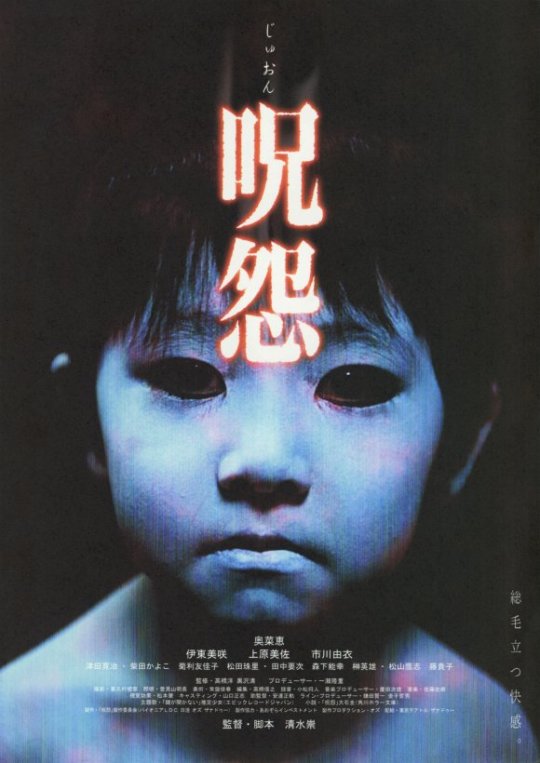
Peanut Dracolich Watches Horror: Ju-On
Oh after the old Hammer Horror films this was a breath of fresh air. It was a legitimately scary film (The Descent beat it out for fear factor I think, but Ju-On might have a longer impact and burn). The film made good use of music and the absence of music, good use of angles to cast things as ‘off’. It was in total a good well made creepy and scary film.
I’d actually say that it might be the best horror film I’ve watched this month. I didn’t enjoy it as much as a good watching of Alien or Evil Dead nor as much as Psycho but it is very much a pure film, a film of scares and creeps and terror that clenches at you. I would suggest it (with caveats but horror is a large enough genre, and one with enough things that can be major ‘nos’, there will always be caveats). That said I don’t feel it’s a film I will want to rewatch; the ghost story was enjoyable once, but it doesn’t have anything to draw me back to it. Which rewatchability while a plus in a film is far from a requirement.
The Good, the Bad, the Ugly, and the Play by Play below the cut.
The Good:
The Overall Effect: It’s actually hard to say ‘this was good’ because the film was overall good. They used silence and then sound early in the film to wonderful effect (sometimes it bordered on ‘you should be scared now’ but that faded as the movie drew you in). I can’t even say ‘this section was best’ because while the first two felt generally weaker, a large part of that was that the effect needed time to build, and grow.
The Covers Scene: If you’ve seen the film you hopefully know what I’m talking about if you haven’t I don’t want to spoil it (the play by play will but).
The Bad:
Early Tomio: The make up job was... It took a bit of extra buy in and suspension the first time he showed up full ghost. In generally the ghosts took a bit of extra buy in and could have ruined the film if I had not been willing to let it go and enjoy and believe. I don’t have a huge problem with these moments (I believe some investment of imagination is deserved by a film), but once or twice in the film it did get to me more than most I mention it for. I could put this in the Ugly (as it’s a visual failing) but as it’s got more stuff in the ‘necessary evil’ category I’m putting it here because it did feel like a legit flaw.
The Ugly:
Temporal Confusion: It jumps around a lot in time. I’d actually say it really ought to have had a X years later with the one section but I don’t think it’d have gotten to me in an English speaking film; subtitles add an extra layer of mental involvement (you’re reading) and that aggravated it. And it did use the confusion to good effect and it’s a legit effect in horror. Still bothered me a bit.
There are no rules: The ghost really does seem to have no real rules. I mean everyone targeted theoretically visits the house (ignoring the implications in the final scene as just artistic license). But we never really learn any rules, and there’s no real meaningful interactions with the ghost. It works, it makes it scarier, but this is a large part of why I don’t really want to rewatch (or I’m sure there’s some folk lore from Japan that adds a little, and small details I could get on a rewatch, but at the amount of effort it’d be more fun to just read up online). It’s a reason I’m not super interested in the sequels in the franchise; despite the film possibly being the best I watched I am not that intrigued by the umpteen sequels. I am certain at some point they add lore, and at some point they contradict that lore, but in a way I’d rather leave it with its lawless purity than see what they do. Still it feels like the curse doesn’t function on any rules other than ‘to an audience this would be scary/freaky’ which makes the suspension of disbelief a bit harder and leaves a subtly bad aftertaste. Again I can’t say this is truly the Bad, because it’s what makes the film work, but it is a double edged sword.
The Ordering of the Last Two Sections: The final section is really a final section, but a throwaway line in the section before it in addition to causing much of the temporal confusion tells you how it ends. The second to last section is the only one where you sort of feel hope for the human’s escape, someone actually doing something to fight the curse and who has been built up in the last section... but this only works if you aren’t paying attention to the time (my thoughts at the time were ‘if there’s 10-20 minutes left in the film she’ll make it, if there’s 30 she’s sure dead’ there were going back later to check 27 at that time of thought). In the end I think the ordering the film used is better, but it is still just a bit bothersome.
The Play by Play:
Ju-On is on to a good creepy start. I am sort of regretting... don't hurt the cat! Ok this is a good creepy start. Lots of blood lots of implied murder. Good start. I am regretting making hot chocolate because my appetite is damaged now. Of artistic note is that they made the opening have washed out and faded colors, not actually black and white but still creating a certain surreal feeling and appearance. Still it's stuff like this, stuff that makes use of music and visuals to create an effect that makes horror movies worth watching. I watch horror because it creates visceral reactions that few other movies do; I might get engaged and energized watching a heroic tale, but that's just one hit and horror can get that sort of energy, but it offers a plethora more.
We then get actual characters at the social welfare center. Someone is handing off a hard case to a volunteer who doesn't want it, and then using it as an excuse to take her to dinner. I feel sorry for her already.
And then we get 'haunted' sound screech. Not trying to create the feeling of terror with it alone, but using the music and fiddling with angles and shots to create a creepy feeling as our volunteer approaches the old lady's house. The house where she gets no response, finds it an absolute sty with everything scatter about, and the old lady unable to get up out of bed to meet her simply clawing at the glass door.
Nishina Rika. We have her name and I'm writing it down because I don't want to call her 'volunteer girl' or 'protag girl'. Rika is just so much easier.
Now this movie knows how to mix eroticism with horror, she's giving the old lady a sponge bath. Forgive me I've watched too many vampire movies of late.
The movie has not been using music outside of that creepy start. It has had minor sounds, and it is using them to good effect. We hear growling, no something scratching at the back of a sealed door and it is creepy. She goes in and we start finally getting some background music and the sudden inclusion after the lack is all the creepier. A cat yowls and we can believe a cat is behind the taped up door. Rika removes the tap to open and see inside... and it's just a cat sitting there peaceful. CREEPY SOUND and then a boy appears in the taped up closet. Rika freaks.
She seems to think she simply missed the child before leaning in to get the cat. I guess that's reasonable, after all children don't suddenly appear. They aren't birds and she wasn't hearing any name.
She starts up the stairs and CREEPY SOUND The boy is looking down at her. I'll admit I sort of jumped at the sound. It is reminiscent to Saw's laugh track except a hundred times more effective since the things are creepy and not 'dude tied up'.
Old lady is talking to ghosts and we have music again. The music rises to really creepy as a shadow demon thing attacks the old lady and then opens its eyes, the child's eyes I think, and looks at Rika. Rika faints.
We get the next part and a name for the hero of this part, but I'm bad with names and was writing the above it is not written down in time.
Same house. Same mess... but it's not quite, there's a couple living in the house, her son and daughter in law. I know I should be creeped, the tension should be holding, but... I'm still a bit burnt out I guess. And then something falls over the, younger old lady, awakens. So it would seem this is either a different family or the past. The ghost child is still there looking down from above, his black cat with him. House wife is sort of freaked out that there's someone and a cat in her house. She doesn't have a cat. In my mind she and her husband have been trying to have a child, but that's just my mind.
Good use of sound, good use of camera. Cat screams, woman screams, we do not see. It's the past, Hitomi and Kazumi, the names that were dropped in the first segment. Everything has been knocked around. The man's been blaming his mom. It's not. It's the ghost, the demonic spirit that has now stolen his wife's soul. Alright she finally reacts to his screaming and shaking, her eyes moving, and her mouth trembling, it did not steal his soul.
It walks behind him as he's calling an ambulance and he doesn't quite see it but he senses something. It's a nice moment. My feet are poised to jump up onto the seat with me. The child isn't there when he's looking, he can't see it, but he can tell there's something.
Now he finally finds it. I must be willing to be afraid, the monster is a child with some pale make up and it's just. It doesn't quite get my feet up... even as his wife dies from the curse. A dark look overcomes his face as his sister arrives.
My feet feel vulnerable still, though.
The son seems to be crazy. I'm getting Jack Nicholson vibes from him. He's lying about where his wife is. He's trying to literally push his sister out of the door, and now is talking about his wife having an affair, how that's not his child. They didn't have a child. There is something wrong here and his sister is just confused.
Possession claims him and he goes to murder his wife as the child smiles like an evil imp.
The next section is Hitomi (the sister/daughter). And we see her making a phone call (I neglected to mention) from the first part. She's NOT in the house. That doesn't mean she's safe. Something is following her. There are strange, scraping footsteps, like something is shuffling. She even sees the shadow move into the stall next to her in the bathroom.
She gets a call from her brother, but all that she gets is the creepy sound of a door creaking. She drops a stuffed bear, and then leans to grab it and a dark haired ghost presents its head. Wisely she runs. Foolishly she sends the building's security guard up after it to his death. But it is not in vain, she watches on CC tv and gets to see... she runs away before she can see and we just know he vanishes after a bit of darkness was creeping up him. Very politely she closes the elevator door in a lady's face, meaning she's alone, alone isn't safe. Alone is where the ghost child watches you. Alone is how he follows you. Every floor. Watching you.
I can already say this is probably the best scare movie I've watched this month. It may not be the scariest, but I've enjoyed it more than the Descent.
And she got a call from her brother asking her apartment number, went to the door, saw him there, opened it and he was gone and the phone made the noise of the ghost. She's run inside, unplugged the phone and ... is hiding under the covers. I'm not sure about that, but now she's trying to watch TV and the TV is freaking out and... She is rightfully scared.
CREEPY STUFF HAPPENS, GHOST IS IN HER COVERS FEET ARE UP
Toyama section. I think Toyama is the jerk from the Rika section.
The old lady is dead now. She had aged much in the short time since something happened to her daughter-in-law, and Rika is completely non-responsive.
How long was it before he checked on Rika and the old lady I wonder?
Still the house is murdering now and they've got a whole bunch of people in it (the cops have been called). They find the son and daughter in law dead in the attic.
I should put my feet down, but the ghost child might get them (and this is more comfy on current chair).
We also have a name Toshio. Toshio is the ghost child. But we've seen two ghosts I think.
Feet are down. Feet are down is scarier. Kayako, Takeo, and Toshio. The family from the beginning. Husband killed wife then found dead. That's how it began. Or so it seems.
The detective who was in charge of the original investigation quit the force and is the only survivor who was involved. That's nice.
Creepy stuff happens. I am glad there is no one jumping out to say boo. Welfare Bully (not Toyama but something that I failed to catch; Hirohashi) is dead. Toyama is the old detective. He is doomed now; his name is the section title. Actually Rika survived and she was a woman and in the house but.
Still we have two ghosts. Small child ghost (Toshio). And shadow lady demon ghost (Kayako) who is capable of looking at you through security footage. That's creepy. I am liking this movie.
They've come for Rika my feet are up.
Toyama has decided to burn the house down. I think this is gonna fail. After all there are sequels, also it just feels too early in the film for that. The house is fucking with him. Showing him scenes from some past. Toyama has been distracted and the cops are looking for her. Still he has to make sure there's not teenager upstairs before burning the house down with schoolgirls inside. Actually they might really have been there, but it feels wrong... and I think the girl who left had the same name as his daughter.
I hear a cat in the other room, it adds to the creep. The ghost lady is crawling around in a crabwalk, and Toyama is found by the cops in the midst of unintelligible panic. They see why and he runs. They are paralyzed with fear as the ghost comes and that close-up is too close.
The new section is the schoolgirl who ran Izumi. Her friends are missing. Her last name is Toyama. So this is the future? Or was Izumi the girl's older sister? Rika just went missing... or was her mom listening to a recording from when her dad went missing too. I miss something in his conversation with small child that would tell. Izumi has taped up her windows to keep the ghosts out and her schoolgirl friends think she's crazy.
She believes the three missing girls are looking in on her. And she is wearing a hidey hoodie.
Feet are back down.
Izumi is crazy. I am not blaming her. But she's gone off the deep end.
Her mom starts talking about that being how her husband was before he died; that he did the same thing with the windows and curtains. She is a broken shell and fears her daughter will die the same way. So yeah house showed him the future. House exists outside of time and space. Izumi is a demon in pictures having pure black eyes... so do the three missing girls. It is the curse.
I am rooting for Izumi to survive. The despair hoodie bring out my sympathies. I like hoodies. Plus the time is about right that it's possible, and she's seeing the ghost of her father. As for the time I feel it's in the last third of the movie, and they're developing Izumi more in that she was important in the last section and this seems to be taking longer to get to the haunting. So it's possible, though far from assured; I'd have to check the time, 30 minutes remaining and she's dead, even 20 and it's a tossup, 10 and she's probably going to live.
Something has torn off her taped up newspapers of window blocking, forming a tiny hole for the ghosts of her friends to watch her through. They're coming for her. Feet are still down. And chief ghost lady has grabbed her head. She's dead. Pulled into the little altar her mother was praying for her dead husband at.
New section is Kayako... the first victim? And we still have ~20 minutes left (after Izumi's death I had to check). We also have Rika again? I thought she got grabbed... I guess she didn't get grabbed till about when Rika did.
A cat touched her leg and Toshio is under the table. She looks older than in the first section, which is well done.
Rika's friend is at the house. Less ghostly Toshio is there. Rika is returning to the house, passing the police tape, to try and save her. Mariko's footsteps are in the dust. The bright, sunny house she saw is not the one we are now.
CREEPY STUFF HAPPENS.
Feet are up.
They're in your reflection you can't escape now. And coming out of your shirt!
I am torn between scared and almost laughing at the blood drenched crab walking ghost. Like she's been scary doing this before, but coming down the stairs in fake blood it manages to cross some line and I lightly lose the ability to take it serious. Off the steps it gets better, and we get every scene of Kayako it feels like, before Rika is alone in the house. But we heard the news of her disappearance. Ah Kayako's husband is coming. Kayako isn't killing he is? At least Rika he's going to kill as Toshio watches.
No one survives. We see an empty town, flyers for the missing littering it. No one survives. Final Creep. Ending Credits. Upbeat music to help recover from creep.
I want the lights on. I have to walk through a cluttered path in the dark for that. Fire and Brimstone.
#peanutdracolich watches horror#Good Film#Don't Want to Rewatch Though#ju on#the grudge#ju on the grudge
2 notes
·
View notes
Link
Back in 2012, I quit the internet for a year. Between May 2012 and May 2013, I didn’t use the internet or ask people to use the internet for me. To make it extra hard, I didn’t use text messaging either.
In a nutshell, I wanted to discover how many of my problems in life (lack of productivity, constant distraction, a sense running as fast as I could just to keep up) were the internet’s fault, and how many of those problems were just my own inherent faults.
Spoiler: it was mostly just me.
But if you’ve been following all the recent Facebook drama or you can’t stand the culture of Twitter discourse or you feel like the Instagram algorithm is harmful to your well-being and you’ve decided that you need to make a statement by quitting something, I might be able to offer some advice.
Boredom
You’re standing in line. You’re sitting down to poop. You’re waiting for the train. You just woke up. You’re about to go to sleep. You’re waiting for a commercial break to finish. It’s not even a commercial break; you just got antsy. You’re bored during a conversation. You’re not bored during a conversation; you just wanted to check something real quick.
You pull out your phone for whatever reason.
What app do you open? And why?
The first question is easy: for me, personally, it’s Twitter. For many other people, it’s Instagram or Facebook.
But the “why” question is harder to answer. There’s a great Why’d You Push That Button? episode that explores how app developers try to create a reward loop to incentivize you to keep checking back. For instance, I check Twitter because someone might’ve read one of my articles and liked it. Or, at the very least, someone might’ve liked one of my tweets or followed me or retweeted me. I’m searching for praise.
What’s messed up about it is I can check Twitter, see nothing new, put my phone in my pocket, and 15 seconds later, I’ll pull my phone out once more to look at Twitter again. It’s a little sick, to be honest.
So, let’s say Facebook is your app of choice. And I’m just going to assume you’re as hooked as I am. What are you going to do every 15 seconds with your thumbs if you quit?
I’m going to humbly suggest, based on personal experience, that you try boredom.
Boredom is a complicated thing. And most people are desperate to avoid it. It turns out that smartphones full of social network apps are a great antidote.
But if you choose to replace your go-to app, whatever it may be, with nothing, you can push through the discomfort of boredom, and you might find something cool on the other side.
Boredom is a dissatisfaction with what you’re doing. If you allow yourself to be bored for just a little bit, you can use that free brain power to decide what you actually want to do. Like, what will make you feel good in the long run, instead of what will make you feel good for the next 15 seconds.
You can use boredom as an alert that you might be living life on auto-pilot, instead of doing what’s actually important to you.
Boredom was seriously one of the best parts of my year without the internet. I eventually discovered new ways to waste time and fill the boredom void, and that kind of ruined everything. But for a few glorious months back in 2012, boredom was my guide to getting shit done and living right.
Loneliness
Without Facebook, or your own social network of choice, it’s very easy to not only be lonely but to actually feel lonely.
The solution is simple: reach out to people. Ask people to meet up. Talk to people on the phone. Text more, and reply to text messages instead of ignoring them. Express concern and interest in other people’s lives with words instead of only Likes and faves and reaction emoji.
Problem solved!
Just kidding. I mean, I do believe that doing those things is the correct antidote to loneliness. But loneliness, both the subjective feeling and the objective reality, never seems that simple to solve.
When I was off the internet, I had some of my best interpersonal successes in life. People said I was “intense” to talk to because I was so undistracted. I got to know family members and some close friends better than I ever had.
But simultaneously, I lost friends and ended up very alone.
What’s up with that?
Well, let’s just be honest with ourselves. The internet is where people are. If your friends are heavy Facebook users, and you quit Facebook, it’s a little bit like if your friends all hang out at a certain bar and you stop going there.
When I was off the internet, I didn’t have any serious blow-ups or falling outs with my friends. I just sort of fell out of step with them.
Here’s an example: let’s say a big new movie is coming out. It’s called Super Cape People. When the trailer hits, maybe one of your friends shares it on Facebook with a comment: “Omg I can’t wait for this.” A few of your other friends with similar tastes chime in. Maybe a dozen other conversations on social media sprout up over the following six months. By the time the movie comes out, you’re pretty sure who you know that wants to see this movie. Maybe you’re even in a Facebook Messenger group of buddies that obsesses over the Super Cape franchise.
But even if you just make midnight screening plans over plain old text message, you have all the social networking context to know who to include. You also know that your friend Jeff is on vacation so maybe you all agree to wait two days to see it with Jeff.
Without social media, you can’t broadcast your interests and availability to your friends. You have to do it in pieces. You need to hang out with people or talk to them on the phone or at least text them to let them know that you love all things Super Cape and drop heavy hints that you’ll be crushed if your friends see it without you.
And what if your friends don’t like phone calls? And what if they forget you quit Facebook when they send out a party invite? And what if your appointed liaison to all Facebook drama becomes tired of being your social networking sherpa?
After a while, if you miss enough parties and are absent enough friend group outings, your friends might assume you aren’t interested.
Sadly, I’m speaking from experience. I’m not trying to scare you away from quitting Facebook. I’m just letting you know that you’ll have to be very proactive to stay in touch with the people you care about.
I wasn’t, and it sucked.
Changing the world
Of course, your friends aren’t the only people using the internet. The internet is a marvelous megaphone. You can speak to anyone or everyone. If you’re super popular on Instagram, and you quit Instagram, you’re silencing your loudest voice. You’re limiting your reach. It almost feels like self-censorship. You set out to protest Facebook, but you’re only hurting yourself, right?
I don’t know. Maybe. This one is complicated.
When I was off the internet, I started a band. While I’ve always been interested in music, and I’ve been in bands before, there was something freeing about being off the internet, creativity-wise. I stopped comparing myself to the best possible version of the thing I was doing. Instead, I just asked myself: “Do I like this?” If I liked it, then I did it. I didn’t feel silenced; I felt free.
This has been freeing in other parts of my life as well. When I was comparing myself to everyone on the internet, I was afraid of programming, math, skateboarding, philosophy, and writing fiction. For each of those activities, I could point to a million people better than me.
I doubt this is debilitating for everyone, but for a long time, I allowed these worldwide comparisons to keep me away from things I was interested in because I knew I couldn’t be great at them.
I think the fear of “de-platforming” yourself gives Facebook and Twitter too much credit, and it also doesn’t give enough credit to what’s actually valuable about your voice and particular set of skills.
Just think about it: would you, given the choice, rather use your words to encourage someone you love or to win a Twitter debate? Are your talents more valuable to your friends and family or to the global economy?
Twitter virality is famously hard to engineer. Facebook makes you pay to actually reach your “audience.” Instagram will always work best for people who only show their most beautiful side.
But your friends love it when you sing at karaoke, no matter what you sound like. And your mom doesn’t doxx you when you disagree with her about politics. She might even change your mind, or you might change hers.
The impact you can have on the people close to you can be just as great, or greater, than the impact you can have on the “world” through your internet voice. Possibly not in quantity, but certainly in quality.
Does that kind of make sense?
Coming back
Hey, I’m not saying you’re going to crack. But you might return to Facebook after a week or month or year away. It might be in a moment of weakness, or it might be something you do deliberately after careful consideration of the pros and cons.
People ask me if I’d consider leaving the internet again. I always say “no way.” Not that I regret my year off the internet. I just feel like I learned the lessons I needed to learn, and the immense positives of the internet — even the weird and scary places like Facebook — outweigh the cons.
One thing I always tell people, and it’s something I wish I did a better job of putting into practice, is to “keep it small.”
It’s a reference to Fahrenheit 451, which is a book I read when I was off the internet, but it’s is also now a hip cultural reference because there’s a Michael B. Jordan movie coming out.
In the sci-fi world of Fahrenheit 451, everyone has these immersive TV rooms. Every wall of the room is a screen. And then they watch TV all the time. It sounds pretty fun, to be honest.
But, also, they burn books. So something isn’t quite right with this society.
When the protagonist meets an outlaw book collector, he’s surprised to discover the collector has a TV. It’s hidden behind a picture frame.
“I like to keep it small,” the collector explains.
Just because you use Facebook doesn’t mean it has to dominate your life. There are ways to “keep it small.” You can reduce Facebook’s ability to gather data on you. You can take the app off your phone. You can block yourself from using it during certain hours of the day. Despite the enormous efforts by internet giants to influence your life and control your behaviors, they haven’t won yet. You still have some power in this relationship.
In summary: book burning is wrong, Michal B. Jordan is possibly my favorite actor on the planet, and if anyone would like to watch his new movie with me it premieres in May on HBO and so let’s start planning this viewing party now. I will bring the chips and perhaps some beverages. Please respond to this invite even if you can’t make it. Thanks! See you there.
Let’s block ads! (Why?)
Source link
The post Facebook quitting advice from a professional internet quitter appeared first on trend views word.
0 notes
Text
Sorting Out Carson Wentz’s Deep Ball Struggles
Carson Wentz is the man. Let’s just get that out of the way.
Three games into his second season, he’s continued to exhibit the raw talent and leadership traits that convinced the Eagles to trade up to get him in the 2016 draft. For the most part, he’s improved on the mechanical flaws from his rookie season and continues to dazzle in his ability to keep plays alive and make a big splash when his team needs it the most.
At this point, there’s little doubt that Wentz is a franchise quarterback. The question becomes, what kind of franchise quarterback can he be? Is he one you win with, or one you win because of?
To move towards the latter, there are areas of his game that he needs to improve on, namely the deep ball. There are certainly other flaws, but finding the ability to consistently connect with his receivers downfield is the one thing keeping him from being great.
Wentz’s deep ball woes have been well documented this season, but just how bad has it been? That depends on who you ask.
If you’re just looking for something to fit your narrative, you can completely ignore all context to the situation, like Football Outsider’s Scott Kacsmar (noted Wentz hater and leader of the Air Yards faction).
Wentz is 3-of-13 on passes thrown 20+ yards, including that fluke completion to Ertz yesterday.
— Scott Kacsmar (@FO_ScottKacsmar) September 18, 2017
This tweet was sent prior to week three, so the statistic itself is no longer relevant, but, then again, it was never relevant in the first place. Not mentioned here is fact that of those 13 attempts, one was a Hail-Mary, two more were Torrey Smith drops, and two others were YOLO balls that Wentz left up for Alshon Jeffery to go grab.
The other important factor to consider is the specifics of each play. No two deep balls are the same. Some are launched from a clean pocket and a perfect throwing platform. Others are quite the opposite.
To bring a more nuanced perspective to Wentz’s downfield accuracy, I broke down every one of his deep balls from the first three weeks and classified them as either on or off-platform throws.
Note: For better perspective, I didn’t include designed intermediate routes and throws. I only included legitimate vertical shots (13 by my count).
Off-Platform or Impacted Throws
Of the 12 downfield passes (excluding the Hail-Mary in Kansas City), eight of them fell into this category, which is slightly encouraging given the significant increase in difficulty that these throws carry with them.
More specifically, there were two passes where Wentz was either hit or was unable to follow through due to defensive pressure. One came on the throw to Smith, which drew the questionable pass interference call:
The other was on a YOLO ball to Jeffery that Wentz actually put in a good spot:
Given the circumstances, it’s difficult to take too much from these two plays because it’s hard to blame a quarterback who is hit while throwing.
Six other throws were either made under duress or came while Wentz was magically evading pressure like Chip Kelly dodging human interaction. This is particularly important to note because very rarely, in these situations, is a quarterback able to throw from a prototypical upright position and get the same trajectory on the ball.
(This is also one of many reasons why I think quarterback mechanics are vastly overvalued by most Twitter quarterback “gurus.” How many times does a quarterback get to throw from a perfect platform in an actual game? Less than we think, but I digress.)
One of the six throws was the touchdown to Nelson Agholor and another drew a pass interference call on Jeffery, so they’re not all bad, but let’s take a look at some of the others.
On this one, versus Kansas City, Wentz rolls out, does a good job ducking under the pressure of the edge defender, and lofts the ball to Smith. The ball hit the receiver in the hands, but, in fairness, this was not a very good throw:
Again, he’s under duress, so I don’t want to kill him too much here, but the fact is that Smith had to make a pretty big adjustment and deal with arguable pass interference because of the ball placement. A well-placed ball leading Smith down the sideline could’ve been a touchdown.
In the next one, Wentz again moves outside the pocket and launches the ball like a sixth grader at recess, but gets nowhere close to Jeffery:
This is a really difficult throw. All of Wentz’s momentum is carrying him to his left and he has to try to push the ball back across the field to his right. However, an argument can also be made that Wentz had more time to settle his feet and throw a better ball. Maybe he made the throw harder than he needed to. Then again, that’s easy to say when I’m not the one about to get destroyed by a 300-pound defensive lineman.
The other four off-platform throws were all similar to the two above. In reviewing them, I came across another theme and potential weakness in Wentz’s game that I thought showed itself a bit in 2016 as well: finishing broken plays.
In fairness, this criticism is a little “nitpicky.” After all, the only reason Wentz even has the opportunity to struggle in these situations is because he’s a magician in the pocket. Not many other quarterbacks can do what he does.
In fact, the only downside to this weakness is the opportunity cost of not making a bigger play. With that said, the ability to make those plays is a real differentiator for a quarterback. Aaron Rodgers and Russell Wilson are known for consistently capitalizing on these sequences. Neither of them would be considered as good as they are without their ability to dunk on these plays.
Wentz doesn’t have to strike on these plays with the same consistency as Rodgers or Wilson to be a good quarterback, but improving in this area could really elevate his game to the next level.
Platform Throws
These four throws were generally more concerning than the other, more difficult, throws discussed. On these, Wentz had decent protection and a good opportunity to set his base and drive the ball to the receiver. This is where mechanics can come into play.
On this first play, versus Washington, Wentz is throwing from a crowded pocket. I actually struggled classifying this one because it looked like he wasn’t able to follow through on his throw. If you look closely, however, there does appear to be room to follow through. Wentz, for whatever reason, didn’t do it:
Not driving his hip through the throw was something he struggled with last season that he needs to continue to be more consistent with.
The next one, from Sunday’s game, is more concerning. Jeffery beat his man and streaked down the sideline while leaving a very nice five-yard space for Wentz to fit the ball into. The route was a quarterback’s dream.
Obviously, Wentz missed the throw, but when watching, pay particular attention to his lead foot as he makes the throw. He pushes it way too far outside towards the sideline and, in turn, so went the ball:
This mechanical error, while small, correlates to some of his struggles from his rookie season.
Is it the end of the world? No, absolutely not. In fact, overall, Wentz’s footwork and mechanics have been much improved this year. These things take time and repetition, but this may be something, similar to Donovan McNabb’s worm killing habit, that we have to deal with on occasion.
The other two throws were the underthrow and overthrow to Smith in the season opener versus Washington. From a mechanical standpoint, both of these plays were fine:
This seems more a matter of Wentz getting on the same page with his new receiver, which, hopefully, will come in time:
While Wentz’s inability to hit the deep ball has been a hot topic of late, I don’t think it’s cause for huge concern just yet. After all, deep shots are a low percentage play for all quarterbacks. When factoring out some of the more difficult, off-platform throws, we’re talking about a sample size of just four throws for a quarterback working with brand new receivers.
The importance of those vertical shots cannot be understated though, both for Wentz and the overall offense.
For Wentz, being able to hit those deep shots will take immense pressure off of him throughout the course of games. As the Giants demonstrated on Sunday, it’s very difficult for any offense to continually move the ball in small chunks. It’s unsustainable, keeps opponents within striking distance, and puts unnecessary pressure on the quarterback.
For the overall offense, striking on these big plays can open up a game and flip that pressure back onto the opposing offense. A good offense has to be able to work the short and intermediate areas of the field while mixing in an effective running game. Generally speaking, the Eagles have done a good job in this area, but adding a quick strike element to the offense can take it to the next level.
Sorting Out Carson Wentz’s Deep Ball Struggles published first on http://ift.tt/2pLTmlv
0 notes